Table of Contents
ASUS H110M-C/CSM User Manual
Displayed below is the user manual for H110M-C/CSM by ASUS which is a product in the Motherboards category. This manual has pages.
Related Manuals

Motherboard
H110M-C
H110M-C/CSM

ii
E10930
Second Edition
September 2015
Copyright © 2015 ASUSTeK COMPUTER INC. All Rights Reserved.
No part of this manual, including the products and software described in it, may be reproduced,
transmitted, transcribed, stored in a retrieval system, or translated into any language in any form or by any
means, except documentation kept by the purchaser for backup purposes, without the express written
permission of ASUSTeK COMPUTER INC. (“ASUS”).
Product warranty or service will not be extended if: (1) the product is repaired, modied or altered, unless
such repair, modication of alteration is authorized in writing by ASUS; or (2) the serial number of the
product is defaced or missing.
ASUS PROVIDES THIS MANUAL “AS IS” WITHOUT WARRANTY OF ANY KIND, EITHER EXPRESS
OR IMPLIED, INCLUDING BUT NOT LIMITED TO THE IMPLIED WARRANTIES OR CONDITIONS OF
MERCHANTABILITY OR FITNESS FOR A PARTICULAR PURPOSE. IN NO EVENT SHALL ASUS, ITS
DIRECTORS, OFFICERS, EMPLOYEES OR AGENTS BE LIABLE FOR ANY INDIRECT, SPECIAL,
INCIDENTAL, OR CONSEQUENTIAL DAMAGES (INCLUDING DAMAGES FOR LOSS OF PROFITS,
LOSS OF BUSINESS, LOSS OF USE OR DATA, INTERRUPTION OF BUSINESS AND THE LIKE),
EVEN IF ASUS HAS BEEN ADVISED OF THE POSSIBILITY OF SUCH DAMAGES ARISING FROM ANY
DEFECT OR ERROR IN THIS MANUAL OR PRODUCT.
SPECIFICATIONS AND INFORMATION CONTAINED IN THIS MANUAL ARE FURNISHED FOR
INFORMATIONAL USE ONLY, AND ARE SUBJECT TO CHANGE AT ANY TIME WITHOUT NOTICE,
AND SHOULD NOT BE CONSTRUED AS A COMMITMENT BY ASUS. ASUS ASSUMES NO
RESPONSIBILITY OR LIABILITY FOR ANY ERRORS OR INACCURACIES THAT MAY APPEAR IN THIS
MANUAL, INCLUDING THE PRODUCTS AND SOFTWARE DESCRIBED IN IT.
Products and corporate names appearing in this manual may or may not be registered trademarks or
copyrights of their respective companies, and are used only for identication or explanation and to the
owners’ benet, without intent to infringe.
Offer to Provide Source Code of Certain Software
This product contains copyrighted software that is licensed under the General Public License (“GPL”),
under the Lesser General Public License Version (“LGPL”) and/or other Free Open Source Software
Licenses. Such software in this product is distributed without any warranty to the extent permitted by the
applicable law. Copies of these licenses are included in this product.
Where the applicable license entitles you to the source code of such software and/or other additional data,
you may obtain it for a period of three years after our last shipment of the product, either
(1) for free by downloading it from http://support.asus.com/download
or
(2) for the cost of reproduction and shipment, which is dependent on the preferred carrier and the location
where you want to have it shipped to, by sending a request to:
ASUSTeK Computer Inc.
Legal Compliance Dept.
15 Li Te Rd.,
Beitou, Taipei 112
Taiwan
In your request please provide the name, model number and version, as stated in the About Box of the
product for which you wish to obtain the corresponding source code and your contact details so that we
can coordinate the terms and cost of shipment with you.
The source code will be distributed WITHOUT ANY WARRANTY and licensed under the same license as
the corresponding binary/object code.
This offer is valid to anyone in receipt of this information.
ASUSTeK is eager to duly provide complete source code as required under various Free Open Source
Software licenses. If however you encounter any problems in obtaining the full corresponding source
code we would be much obliged if you give us a notication to the email address gpl@asus.com, stating
the product and describing the problem (please DO NOT send large attachments such as source code
archives, etc. to this email address).

iii
Contents
Safety information ...................................................................................... iv
About this guide ......................................................................................... iv
Package contents ....................................................................................... vi
H110M-C specications summary ............................................................ vi
Chapter 1: Product introduction
1.1 Before you proceed ..................................................................... 1-1
1.2 Motherboard overview ................................................................. 1-1
1.3 Central Processing Unit (CPU) ................................................... 1-3
1.4 System memory ........................................................................... 1-6
1.5 Expansion slots ............................................................................ 1-9
1.6 Headers and Jumpers ................................................................ 1-10
1.7 Connectors ................................................................................. 1-11
1.8 Software support ........................................................................ 1-19
1.9 Installing an operating system ................................................. 1-20
Chapter 2: BIOS information
2.1 Managing and updating your BIOS ............................................ 2-1
2.2 BIOS setup program .................................................................... 2-6
2.3 My Favorites ............................................................................... 2-12
2.4 Main menu .................................................................................. 2-13
2.5 Ai Tweaker menu ........................................................................ 2-15
2.6 Advanced menu ......................................................................... 2-19
2.7 Monitor menu ............................................................................. 2-27
2.8 Boot menu .................................................................................. 2-30
2.9 Tool menu ................................................................................... 2-35
2.10 Exit menu .................................................................................... 2-37
Appendices
Notices .......................................................................................................A-1
ASUS contact information .......................................................................A-4

iv
Safety information
Electrical safety
• To prevent electrical shock hazard, disconnect the power cable from the electrical outlet
before relocating the system.
• When adding or removing devices to or from the system, ensure that the power cables
for the devices are unplugged before the signal cables are connected. If possible,
disconnect all power cables from the existing system before you add a device.
• Before connecting or removing signal cables from the motherboard, ensure that all
power cables are unplugged.
• Seek professional assistance before using an adapter or extension cord. These devices
could interrupt the grounding circuit.
• Ensure that your power supply is set to the correct voltage in your area. If you are not
sure about the voltage of the electrical outlet you are using, contact your local power
company.
• If the power supply is broken, do not try to x it by yourself. Contact a qualied service
technician or your retailer.
Operation safety
• Before installing the motherboard and adding components, carefully read all the manuals
that came with the package.
• Before using the product, ensure all cables are correctly connected and the power
cables are not damaged. If you detect any damage, contact your dealer immediately.
• To avoid short circuits, keep paper clips, screws, and staples away from connectors,
slots, sockets and circuitry.
• Avoid dust, humidity, and temperature extremes. Do not place the product in any area
where it may be exposed to moisture.
• Place the product on a stable surface.
• If you encounter technical problems with the product, contact a qualied service
technician or your retailer.
About this guide
This user guide contains the information you need when installing and conguring the
motherboard.
How this guide is organized
This guide contains the following parts:
• Chapter 1: Product introduction
This chapter describes the features of the motherboard and the new technology it
supports. It includes descriptions of the switches, jumpers, and connectors on the
motherboard.
• Chapter 2: BIOS information
This chapter discusses changing system settings through the BIOS Setup menus.
Detailed descriptions for the BIOS parameters are also provided.

v
Where to nd more information
Refer to the following sources for additional information and for product and software
updates.
1. ASUS websites
The ASUS website provides updated information on ASUS hardware and software
products. Refer to the ASUS contact information.
2. Optional documentation
Your product package may include optional documentation, such as warranty yers,
that may have been added by your dealer. These documents are not part of the
standard package.
Conventions used in this guide
To ensure that you perform certain tasks properly, take note of the following symbols used
throughout this manual.
DANGER/WARNING: Information to prevent injury to yourself when
completing a task.
CAUTION: Information to prevent damage to the components when
completing a task
IMPORTANT: Instructions that you MUST follow to complete a task.
NOTE: Tips and additional information to help you complete a task.
Typography
Bold text Indicates a menu or an item to select.
Italics
Used to emphasize a word or a phrase.
<Key> Keys enclosed in the less-than and greater-than sign
means that you must press the enclosed key.
Example: <Enter> means that you must press the Enter or
Return key.
<Key1> + <Key2> + <Key3> If you must press two or more keys simultaneously, the key
names are linked with a plus sign (+).

vi
H110M-C specications summary
(continued on the next page)
Package contents
Check your motherboard package for the following items.
Motherboard ASUS H110M-C motherboard
Cables 2 x Serial ATA 6.0 Gb/s cables
Accessories 1 x I/O Shield
Application DVD Support DVD
Documentation User Guide
If any of the above items is damaged or missing, contact your retailer.
CPU
LGA1151 socket for 6th Generation Intel® Core™ i7/ i5/ i3, Pentium® and Celeron®
processors
Supports 14nm CPU
Supports Intel® Turbo Boost Technology 2.0
* The Intel® Turbo Boost Technology 2.0 support depends on the CPU types.
** Refer to www.asus.com for Intel® CPU support list.
Chipset Intel® H110 Express Chipset
Memory
2 x DIMMs, max. 32 GB, DDR4 2133/1866 MHz, non-ECC, un-buffered memory
Dual-channel memory architecture
Supports Intel® Extreme Memory Prole (XMP)
* Hyper DIMM support is subject to the physical characteristics of individual CPUs. Please
refer to Memory QVL (Qualied Vendors List) for details.
** Refer to www.asus.com for the Memory QVL(Qualied Vendors List).
Graphics
Integrated Graphics Processor - Intel® HD Graphics support
Multi-VGA output support: DVI-D, RGB ports
- Supports DVI-D with max. resolution of 1920 x 1200 @ 60Hz
- Supports RGB with max. resolution of 1920 x 1200 @ 60Hz
Supports Quick Sync Video and Clear Video HD Technology
Maximum shared memory of 1024 MB
Expansion
slots
1 x PCI Express 3.0/2.0 x16 slot (@ x16 mode)
2 x PCI Express 2.0 x1 slots
1 x PCI slot
Audio
Realtek ALC887 8-channel High Denition Audio CODEC
* Use a chassis with HD audio module in the front panel to support an 8-channel audio
output.
Storage Intel® H110 Express Chipset
- 4 x Serial ATA 6.0 Gb/s connectors (gray)
LAN Realtek® RTL8111H Gigabit LAN Controller
USB 4 x USB 3.0/2.0 ports (2 ports at mid-board, 2 ports at the back panel)
6 x USB 2.0/1.1 ports (2 ports at mid-board, 4 ports at the back panel)

vii
H110M-C specications summary
(continued on the next page)
ASUS unique
features
Dependable stability:
ASUS 5X PROTECTION II
- ASUS LANGuard - Surge-protected networking
- ASUS Overvoltage Protection - World-class circuit-protecting power design
- ASUS DRAM Overcurrent Protection - Enhanced DRAM overcurrent
protection
- ASUS Stainless Steel Back I/O - 3X more durable
- ESD Guards - Electrostatic discharge protection
Superb performance:
UEFI BIOS:
- Most advanced options with fast response time
EZ PC DIY:
Safe motherboard mounting
- Component-free areas to minimize damage risk
Q-Design
- ASUS Q-DIMM
- ASUS Q-Slot
UEFI BIOS EZ Mode - featuring friendly graphics user interface
- ASUS CrashFree BIOS 3
- ASUS EZ Flash 3
Optimized Cooling
- ASUS Fan Xpert
- Stylish Fanless Design: PCH Heat-sink
One Stop Control
AI Suite 3
Push Notice
- Monitor your PC status with smart devices in real time
Mobo Connect
- All-in-one control between your PC and smart device
Media Streamer
- Pipe music or movies from your PC to a smart TV
- Media Streamer app for portable smartphone/tablet, supporting iOS 7 and
Android 4.0 system
Ai Charger
Rear panel
I/O ports
1 x PS/2 keyboard (purple)
1 x PS/2 mouse port (green)
1 x DVI-D port
1 x D-Sub port
1 x LAN (RJ-45) port
1 x COM port
2 x USB 3.0/2.0 ports
4 x USB 2.0/1.1 ports
3 Audio jacks support 8-channel audio output

viii
H110M-C specications summary
Specications are subject to change without notice.
Internal
connectors
1 x USB 2.0/1.1 connector supports additional 2 USB 2.0/1.1 ports
1 x USB 3.0 connector supports additional 2 USB 3.0 port
4 x SATA 6.0 Gb/s connectors
1 x 14-1 pin TPM connector
1 x COM connector
1 x Parallel connector
1 x CPU fan connector (4-pin)
1 x Chassis Fan connectors (4-pin)
1 x Front panel audio connector (AAFP)
1 x 24-pin EATX power connector
1 x 4-pin ATX 12V power connector
1 x System panel connector
1 x Speaker connector
1 x Clear CMOS header (2-pin)
1 x Chassis intrusion header
BIOS features
128 Mb Flash ROM, UEFI AMI BIOS, PnP, DMI3.0, WfM2.0, SM BIOS 3.0, ACPI
5.0, Multi-language BIOS, ASUS EZ Flash 3, ASUS CrashFree BIOS 3, My
Favorites, Quick Note, Last Modied log, F12 PrintScreen, ASUS DRAM SPD
(Serial Presence Detect) memory information, F6 Qfan Control
Manageability WfM 2.0, DMI 3.0, WOL by PME, PXE
Support DVD
Drivers
ASUS utilities
EZ Update
Anti-virus software (OEM version)
OS support
Windows® 10*
Windows® 8.1*
Windows® 7
* 64-bit supported only.
Form factor uATX Form Factor, 9.6” x 7.2” (24.4 cm x 18.2cm)

ASUS H110M-C 1-1
Product introduction
1
1.1 Before you proceed
Take note of the following precautions before you install motherboard components or change
any motherboard settings.
• Unplugthepowercordfromthewallsocketbeforetouchinganycomponent.
• Beforehandlingcomponents,useagroundedwriststraportouchasafelygrounded
objectorametalobject,suchasthepowersupplycase,toavoiddamagingthemdue
to static electricity.
• Beforeyouinstallorremoveanycomponent,ensurethattheATXpowersupplyis
switched off or the power cord is detached from the power supply. Failure to do so
maycauseseveredamagetothemotherboard,peripherals,orcomponents.
1.2 Motherboard overview
Beforeyouinstallthemotherboard,studythecongurationofyourchassistoensurethatthe
motherboardts.
Unplugthepowercordbeforeinstallingorremovingthemotherboard.Failuretodosocan
cause you physical injury and damage to motherboard components.
1.2.1 Placement direction
Wheninstallingthemotherboard,placeitintothechassisinthecorrectorientation.Theedge
with external ports goes to the rear part of the chassis as indicated in the image.
1.2.2 Screw holes
Place six screws into the holes indicated by circles to secure the motherboard to the chassis.
Donotovertightenthescrews!Doingsocandamagethemotherboard.

1-2 Chapter 1: Product introduction
Place this side
towards the rear
of the chassis
1.2.3 Motherboard layout
H110M-C
H110M-C
PCIEX16
PCIEX1_1
PCIEX1_2
PCI1
USB3_12
F_PANEL
CLRTC
USB910
LPT
AAFP
COM1
CHA_FAN
CHASSIS
SPEAKER
ATX12V
EATXPWR
CPU_FAN
BATTERY
Super
I/O
ALC
887
RTL
8111H
LGA1151
Intel®
H110
DDR4 DIMM_A1 (64bit, 288-pin module)
DDR4 DIMM_B1 (64bit, 288-pin module)
SATA6G_4 SATA6G_3 SATA6G_2 SATA6G_1
AUDIO
LANGuard
KBMS
18.2cm(7.2in)
24.4cm(9.6in)
128Mb
BIOS
COM2
LAN_USB3_34
USB5~8
DVI
VGA
TPM
ASM
1083
32 21 4
1
5
1415 13
7
8
6
9101112

ASUS H110M-C 1-3
1.2.4 Layout contents
1.3 Central Processing Unit (CPU)
ThismotherboardcomeswithasurfacemountLGA1151socketdesignedforthe6th
Generation Intel®Core™i7/Core™i5/Core™i3,Pentium® and Celeron® processors.
Connectors/Jumpers/Slots/LED Page
1. ATXpowerconnectors(24-pinEATXPWR,4-pinATX12V) 1-15
2. CPUandchassisfanconnectors(4-pinCPU_FAN,4-pinCHA_FAN) 1-13
3. Intel®LGA1151CPUsocket 1-3
4. DDR4DIMMslots 1-6
5. USB3.0connector(20-1pinUSB3_12) 1-14
6. ClearRTCRAM(2-pinCLRTC) 1-10
7. Systempanelconnector(10-1pinF_PANEL) 1-17
8. Speakerconnector(4-pinSPEAKER) 1-15
9. Intel®H110SerialATA6.0Gb/sconnector(7-pinSATA6G_1~4) 1-16
10. USB2.0connector(10-1pinUSB910) 1-14
11. LPTconnector(26-1pinLPT) 1-13
12. Chassisintrusionconnector(4-1pinCHASSIS) 1-11
13. TPMconnector(14-1pinTPM) 1-18
14. Frontpanelaudioconnector(10-1pinAAFP) 1-16
15. Serialportconnector(10-1pinCOM1) 1-18
H110M-C
H110M-C CPU socket LGA1151
UnplugallpowercablesbeforeinstallingtheCPU.

1-4 Chapter 1: Product introduction
1.3.1 Installing the CPU
1
23
A
B
• EnsurethatyouinstallthecorrectCPUdesignedfortheLGA1151socketonly.DO
NOTinstallaCPUdesignedforLGA1150,LGA1155andLGA1156socketsonthe
LGA1151socket.
• Uponpurchaseofthemotherboard,ensurethatthePnPcapisonthesocketand
the socket contacts are not bent. Contact your retailer immediately if the PnP cap
ismissing,orifyouseeanydamagetothePnPcap/socketcontacts/motherboard
components.
• Keepthecapafterinstallingthemotherboard.ASUSwillprocessReturnMerchandise
Authorization(RMA)requestsonlyifthemotherboardcomeswiththecaponthe
LGA1151socket.
• Theproductwarrantydoesnotcoverdamagetothesocketcontactsresultingfrom
incorrectCPUinstallation/removal,ormisplacement/loss/incorrectremovalofthePnP
cap.

ASUS H110M-C 1-5
A
B
C
5
4
1.3.2 CPU heatsink and fan assembly installation
ApplytheThermalInterfaceMaterial
totheCPUheatsinkandCPU
before you install the heatsink and
fan if necessary.
To install the CPU heatsink and fan assembly
2
B
A
A
B
1

1-6 Chapter 1: Product introduction
3 4
A
B
B
A
To uninstall the CPU heatsink and fan assembly
2
1
1.4 System memory
1.4.1 Overview
ThismotherboardcomeswithfourDoubleDataRate4(DDR4)DualInlineMemoryModule
(DIMM)sockets.
ADDR4moduleisnotcheddifferentlyfromaDDR,DDR2,orDDR3module.DONOT
installaDDR,DDR2,orDDR3memorymoduletotheDDR4slot.
Channel Sockets
ChannelA DIMM_A1
ChannelB DIMM_B1
H110M-C
H110M-C 288-pin DDR4 DIMM sockets
DIMM_A1
DIMM_B1

ASUS H110M-C 1-7
1.4.2 Memorycongurations
Youmayinstall2GB,4GB,8GB,and16GBunbufferednon-ECCDDR4DIMMsintothe
DIMMsockets.Youcanrefertotherecommendedmemorypopulationbelow.
Recommendedmemorycongurations
• YoumayinstallvaryingmemorysizesinChannelAandChannelB.Thesystemmaps
thetotalsizeofthelower-sizedchannelforthedual-channelconguration.Anyexcess
memoryfromthehigher-sizedchannelisthenmappedforsingle-channeloperation.
• Duetothememoryaddresslimitationon32-bitWindows®OS,whenyouinstall4GB
ormorememoryonthemotherboard,theactualusablememoryfortheOScanbe
about3GBorless.Foreffectiveuseofmemory,werecommendthatyoudoanyofthe
following:
- Useamaximumof3GBsystemmemoryifyouareusinga32-bitWindows®OS.
- Installa64-bitWindows®OSifyouwanttoinstall4GBormoreonthe
motherboard.
- Formoredetails,refertotheMicrosoft® support site at http://support.microsoft.
com/kb/929605/en-us.
• ThedefaultmemoryoperationfrequencyisdependentonitsSerialPresenceDetect
(SPD),whichisthestandardwayofaccessinginformationfromamemorymodule.
Underthedefaultstate,somememorymodulesforoverclockingmayoperateata
lowerfrequencythanthevendor-markedvalue.Tooperateatthevendor-marked
oratahigherfrequency,refertosection2.5 Ai Tweaker menu for manual memory
frequencyadjustment.
• AlwaysinstalltheDIMMSwiththesameCASLatency.Foranoptimumcompatibility,
werecommendthatyouinstallmemorymodulesofthesameversionordatacode
(D/C)fromthesamevendor.Checkwiththevendortogetthecorrectmemory
modules.
VisittheASUSwebsiteatwww.asus.comforthelatestQVL.

1-8 Chapter 1: Product introduction
1.4.3 Installing a DIMM
1
2
3
To remove a DIMM
BA

ASUS H110M-C 1-9
1.5 Expansion slots
Inthefuture,youmayneedtoinstallexpansioncards.Thefollowingsub-sectionsdescribe
the slots and the expansion cards that they support.
Unplugthepowercordbeforeaddingorremovingexpansioncards.Failuretodosomay
cause you physical injury and damage motherboard components.
1.5.1 Installing an expansion card
To install an expansion card:
1. Beforeinstallingtheexpansioncard,readthedocumentationthatcamewithitand
make the necessary hardware settings for the card.
2. Removethesystemunitcover(ifyourmotherboardisalreadyinstalledinachassis).
3. Removethebracketoppositetheslotthatyouintendtouse.Keepthescrewforlater
use.
4. Alignthecardconnectorwiththeslotandpressrmlyuntilthecardiscompletely
seated on the slot.
5. Securethecardtothechassiswiththescrewyouremovedearlier.
6. Replacethesystemcover.
1.5.2 Conguringanexpansioncard
Afterinstallingtheexpansioncard,congureitbyadjustingthesoftwaresettings.
1. TurnonthesystemandchangethenecessaryBIOSsettings,ifany.SeeChapter2for
informationonBIOSsetup.
2. AssignanIRQtothecard.
3. Installthesoftwaredriversfortheexpansioncard.
WhenusingPCIcardsonsharedslots,ensurethatthedriverssupport“ShareIRQ”orthat
thecardsdonotneedIRQassignments.Otherwise,conictswillarisebetweenthetwoPCI
groups,makingthesystemunstableandthecardinoperable.
1.5.3 PCI slot
ThePCIslotsupportscardssuchasaLANcard,SCSIcard,USBcard,andothercardsthat
complywithPCIspecications.
1.5.4 PCI Express 2.0 x1 slots
ThismotherboardsupportsPCIExpressx1networkcards,SCSIcards,andothercardsthat
complywiththePCIExpressspecications.
1.5.5 PCI Express 3.0/2.0 x16 slot
ThismotherboardhasonePCIExpress3.0/2.0x16slotthatsupportsPCIExpress2.0x16
graphiccardscomplyingwiththePCIExpressspecications.

1-10 Chapter 1: Product introduction
IRQ assignments for this motherboard
A B C D E F G H
PCIEx16_1 shared – – – – – – –
PCIEx1_1 – – shared – – – – –
PCIEx1_2 – – – shared – – – –
PCI 1 – – shared – – – – –
Realtek8111HLAN
Controller – – – shared – – – –
HDAudio shared – – – – – – –
SATAController shared – – – – – – –
XHCIController shared – – – – – – –
1.6 Headers and Jumpers
1. Clear RTC RAM (2-pin CLRTC)
ThisheaderallowsyoutocleartheRealTimeClock(RTC)RAMinCMOS.Youcan
cleartheCMOSmemoryofdate,time,andsystemsetupparametersbyerasingthe
CMOSRTCRAMdata.TheonboardbuttoncellbatterypowerstheRAMdatain
CMOS,whichincludesystemsetupinformationsuchassystempasswords.
To erase the RTC RAM:
1. TurnOFFthecomputerandunplugthepowercord.
2. Useametalobjectsuchasascrewdrivertoshortthetwopins.
3. PlugthepowercordandturnONthecomputer.
4. Holddownthe<Del>keyduringthebootprocessandenterBIOSsetuptore-
enter data.
CLRTC
+3V_BAT
GND
PIN 1
H110M-C
H110M-C Clear RTC RAM
• Ifthestepsabovedonothelp,removetheonboardbatteryandshortthetwopins
againtocleartheCMOSRTCRAMdata.AfterclearingtheCMOS,reinstallthe
battery.
• YoudonotneedtocleartheRTCwhenthesystemhangsduetooverclocking.For
systemfailureduetooverclocking,usetheCPUParameterRecall(C.P.R.)feature.
Shutdownandrebootthesystem,thentheBIOSautomaticallyresetsparameter
settingstodefaultvalues.

ASUS H110M-C 1-11
1.7 Connectors
1.7.1 Rear panel connectors
5 64
78
1
11 9
32
10
1. PS/2 mouse port (green).ThisportisforaPS/2mouse.
2. Serial port.This9-pinCOMportisforpointingdevicesorotherserialdevices.
3. Video Graphics Adapter (VGA) port.This15-pinportisforaVGAmonitororother
VGA-compatibledevices.
4. LAN (RJ-45) port.ThisportallowsGigabitconnectiontoaLocalAreaNetwork(LAN)
through a network hub.
2. Chassis intrusion header (4-1 pin CHASSIS)
This header is for a chassis-mounted intrusion detection sensor or switch. Connect one
end of the chassis intrusion sensor or switch cable to this header. The chassis intrusion
sensororswitchsendsahigh-levelsignaltothisheaderwhenachassiscomponentis
removedorreplaced.Thesignalisthengeneratedasachassisintrusionevent.
Bydefault,thepinlabeled“ChassisSignal”and“Ground”areshortedwithajumper
cap.Removethejumpercapsonlywhenyouintendtousethechassisintrusion
detection feature.
H110M-C
H110M-C Chassis intrusion connector
+5VSB_MB
Chassis Signal
GND
CHASSIS

1-12 Chapter 1: Product introduction
Audio2.1,4.1,5.1,or7.1-channelconguration
8. USB 3.0 ports 3 and 4.These9-pinUniversalSerialBus(USB)portsareforUSB3.0
devices.
• DuetothelimitationofUSB3.0controller,USB3.0devicescanonlybeusedunder
WindowsOSenvironmentandaftertheUSB3.0driverinstallation.
• WestronglyrecommendthatyouconnectUSB3.0devicestoUSB3.0portsforfaster
andbetterperformancefromyourUSB3.0devices.
9. USB 2.0 ports.Thesefour4-pinUniversalSerialBus(USB)portsareforUSB2.0/1.1
devices.
10. DVI-D port.ThisportisforanyDVI-Dcompatibledevice.
DVI-DcannotbeconvertedtooutputfromRGBSignaltoCRTandisnotcompatiblewith
DVI-I.
11. PS/2 keyboard port (purple).ThisportisforaPS/2keyboard.
Port Headset
2-channel 4-channel 6-channel 8-channel
LightBlue(Rearpanel) Line In RearSpeakerOut RearSpeakerOut RearSpeakerOut
Lime(Rearpanel) LineOut FrontSpeakerOut FrontSpeakerOut FrontSpeakerOut
Pink(Rearpanel) MicIn MicIn Bass/Center Bass/Center
Lime(Frontpanel) - - - SideSpeakerOut
5. Line In port (light blue).Thisportconnectstothetape,CD,DVDplayer,orother
audio sources.
6. Line Out port (lime).Thisportconnectstoaheadphoneoraspeaker.Inthe4.1,5.1
and7.1-channelcongurations,thefunctionofthisportbecomesFrontSpeakerOut.
LAN port
Speed
LED
Activity Link
LED
Activity/Link LED Speed LED
Status Description Status Description
Off Nolink OFF 10Mbpsconnection
Orange Linked ORANGE 100Mbpsconnection
Orange
(Blinking)
Dataactivity GREEN 1Gbps connection
Orange
(Blinkingthen
steady)
Readyto
wake up from
S5mode
_ _
7. Microphone port (pink). This port connects to a microphone.
Refertotheaudiocongurationtableforthefunctionoftheaudioportsin2.1,4.1,5.1,or
7.1-channelconguration.
LAN port LED indications

ASUS H110M-C 1-13
Donotforgettoconnectthefancablestothefanconnectors.Insufcientairowinside
thesystemmaydamagethemotherboardcomponents.Thesearenotjumpers!Donot
placejumpercapsonthefanconnectors!TheCPU_FANconnectorsupportsaCPUfanof
maximum1A(12W)fanpower.
Onlythe4-pinCPUfanand4-pinchassisfansupporttheASUSFanXpertfeature.
1.7.2 Internal connectors
1. CPU and chassis fan connectors (4-pin CPU_FAN, 4-pin CHA_FAN)
Connectthefancablestothefanconnectorsonthemotherboard,ensuringthatthe
black wire of each cable matches the ground pin of the connector
2. LPT connector (26-1 pin LPT)
TheLPT(LinePrintingTerminal)connectorsupportsdevicessuchasaprinter.LPT
standardizesasIEEE1284,whichistheparallelportinterfaceonIBMPC-compatible
computers.
H110M-C
H110M-C Fan connectors
CPU_FAN
CPU FAN PWM
CPU FAN IN
CPU FAN PWR
GND
CHA FAN PWM
CHA FAN IN
CHA FAN PWR
GND
CHA_FAN
H110M-C
H110M-C Parallel port connector
LPT
PIN 1
O_LPT_XSTB#_R
O_LPT_XPD0_R
O_LPT_XPD1_R
O_LPT_XPD2_R
O_LPT_XPD3_R
O_LPT_XPD4_R
O_LPT_XPD5_R
O_LPT_XPD6_R
O_LPT_XPD7_R
O_LPT_ACK#_R
O_LPT_BUSY_R
O_LPT_PE_R
O_LPT_SLCT_R
O_LPT_XAFD#_R
O_LPT_ERROR#_R
O_LPT_XINIT#_R
O_LPT_XSLIN#_R
GND
GND
GND
GND
GND
GND
GND
GND

1-14 Chapter 1: Product introduction
3. USB 2.0 connector (10-1 pin USB910)
ThisconnectorisforUSB2.0ports.ConnecttheUSBmodulecabletothisconnector,
then install the module to a slot opening at the back of the system chassis. This
USBconnectorcomplieswithUSB2.0specicationsandsupportsupto480Mbps
connection speed.
Neverconnecta1394cabletotheUSBconnectors.Doingsowilldamagethe
motherboard!
TheUSB2.0moduleispurchasedseparately.
4. USB 3.0 connector (20-1 pin USB3_12)
ThisconnectorallowsyoutoconnectaUSB3.0moduleforadditionalUSB3.0front
orrearpanelports.WithaninstalledUSB3.0module,youcanenjoyallthebenetsof
USB3.0includingfasterdatatransferspeedsofupto5Gbps,fasterchargingtimefor
USB-chargeabledevices,optimizedpowerefciency,andbackwardcompatibilitywith
USB2.0.
TheUSB3.0moduleispurchasedseparately.
H110M-C
USB910
PIN 1
USB+5V
USB_P9-
USB_P9+
GND
NC
USB+5V
USB_P10-
USB_P10+
GND
H110M-C USB2.0 connector
H110M-C
H110M-C USB3.0 front panel connector
USB3_12
USB3+5V
IntA_P1_SSRX-
IntA_P1_SSRX+
GND
IntA_P1_SSTX-
IntA_P1_SSTX+
GND
IntA_P1_D-
IntA_P1_D+
GND
PIN 1
USB3+5V
IntA_P2_SSRX-
IntA_P2_SSRX+
GND
IntA_P2_SSTX-
IntA_P2_SSTX+
GND
IntA_P2_D-
IntA_P2_D+

ASUS H110M-C 1-15
•
Forafullyconguredsystem,werecommendthatyouuseapowersupplyunit
(PSU)thatcomplieswithATX12VSpecication2.0(orlaterversion)andprovidesa
minimumpowerof350W.
•
DONOTforgettoconnectthe4-pinATX+12Vpowerplug.Otherwise,thesystemwill
not boot up.
• WerecommendthatyouuseaPSUwithhigherpoweroutputwhenconguringa
systemwithmorepower-consumingdevicesorwhenyouintendtoinstalladditional
devices.Thesystemmaybecomeunstableormaynotbootupifthepoweris
inadequate.
•
Ifyouareuncertainabouttheminimumpowersupplyrequirementforyoursystem,
refertotheRecommendedPowerSupplyWattageCalculatorathttp://support.asus.
com/PowerSupplyCalculator/PSCalculator.aspx?SLanguage=en-us for details.
5. ATX power connectors (24-pin EATXPWR, 4-pin ATX12V)
TheseconnectorsareforATXpowersupplyplugs.Thepowersupplyplugsare
designedtottheseconnectorsinonlyoneorientation.Findtheproperorientationand
pushdownrmlyuntiltheconnectorscompletelyt.
6. Speaker connector (4-pin SPEAKER)
The4-pinconnectorisforthechassis-mountedsystemwarningspeaker.Thespeaker
allows you hear system beeps and warnings.
H110M-C
H110M-C ATX power connectors
EATXPWR
PIN 1
GND
+5 Volts
+5 Volts
+5 Volts
-5 Volts
GND
GND
GND
PSON#
GND
-12 Volts
+3 Volts
+3 Volts
+12 Volts
+12 Volts
+5V Standby
Power OK
GND
+5 Volts
GND
+5 Volts
GND
+3 Volts
+3 Volts
ATX12V
PIN 1
+12V DC
+12V DC
GND
GND
H110M-C
H110M-C Speaker out connector
+5V
GND
GND
Speaker Out
SPEAKER
PIN 1

1-16 Chapter 1: Product introduction
7. Front panel audio connector (10-1 pin AAFP)
Thisconnectorisforachassis-mountedfrontpanelaudioI/Omodulethatsupports
eitherHDAudioorlegacyAC`97audiostandard.Connectoneendofthefrontpanel
audioI/Omodulecabletothisconnector.
• Werecommendthatyouconnectahigh-denitionfrontpanelaudiomoduletothis
connectortoavailofthemotherboard’shigh-denitionaudiocapability.
• Ifyouwanttoconnectahigh-denitionfrontpanelaudiomoduletothisconnector,set
theFrontPanelTypeitemintheBIOSsetupto[HDAudio].Ifyouwanttoconnectan
AC’97frontpanelaudiomoduletothisconnector,settheitemto[AC97].Bydefault,
thisconnectorissetto[HDAudio].SeesectionOnboardDevicesConguration for
details.
8. Intel® H110 Serial ATA 6.0Gb/s connectors (7-pin SATA6G_1~4)
TheseconnectorsconnecttoSerialATA6.0Gb/sharddiskdrivesviaSerialATA6.0
Gb/s signal cables.
H110M-C
H110M-C Front panel audio connector
AAFP
PIN 1
AGND
NC
SENSE1_RETUR
SENSE2_RETUR
PORT1 L
PORT1 R
PORT2 R
SENSE_SEND
PORT2 L
HD-audio-compliant
pin definition
PIN 1
AGND
NC
NC
NC
MIC2
MICPWR
Line out_R
NC
Line out_L
Legacy AC’97
compliant definition
SATA6G_4
GND
RSATA_RXP4
RSATA_RXN4
GND
RSATA_TXN4
RSATA_TXP4
GND
SATA6G_3
GND
RSATA_RXP3
RSATA_RXN3
GND
RSATA_TXN3
RSATA_TXP3
GND
SATA6G_2
GND
RSATA_RXP2
RSATA_RXN2
GND
RSATA_TXN2
RSATA_TXP2
GND
SATA6G_1
GND
RSATA_RXP1
RSATA_RXN1
GND
RSATA_TXN1
RSATA_TXP1
GND
H110M-C
H110M-C SATA 6.0Gb/s connectors

ASUS H110M-C 1-17
9. System panel connector (10-1 pin F_PANEL)
Thisconnectorsupportsseveralchassis-mountedfunctions.
• SystempowerLED(2-pinPWR_LED)
This2-pinconnectorisforthesystempowerLED.ConnectthechassispowerLED
cabletothisconnector.ThesystempowerLEDlightsupwhenyouturnonthesystem
power,andblinkswhenthesystemisinsleepmode.
• HarddiskdriveactivityLED(2-pinHDD_LED)
This2-pinconnectorisfortheHDDActivityLED.ConnecttheHDDActivityLEDcable
tothisconnector.TheHDDLEDlightsuporasheswhendataisreadfromorwritten
totheHDD.
• ATXpowerbutton/soft-offbutton(2-pinPWR_BTN)
This connector is for the system power button.
• Resetbutton(2-pinRESET)
This 2-pin connector is for the chassis-mounted reset button for system reboot without
turning off the system power.
H110M-C
PIN 1
PWR BTN
PWR_LED+
PWR_LED-
PWR
GND
HDD_LED+
HDD_LED-
Ground
HWRST#
(NC)
F_PANEL
+PWR LED-
+HDD_LED- RESET
H110M-C System panel connector
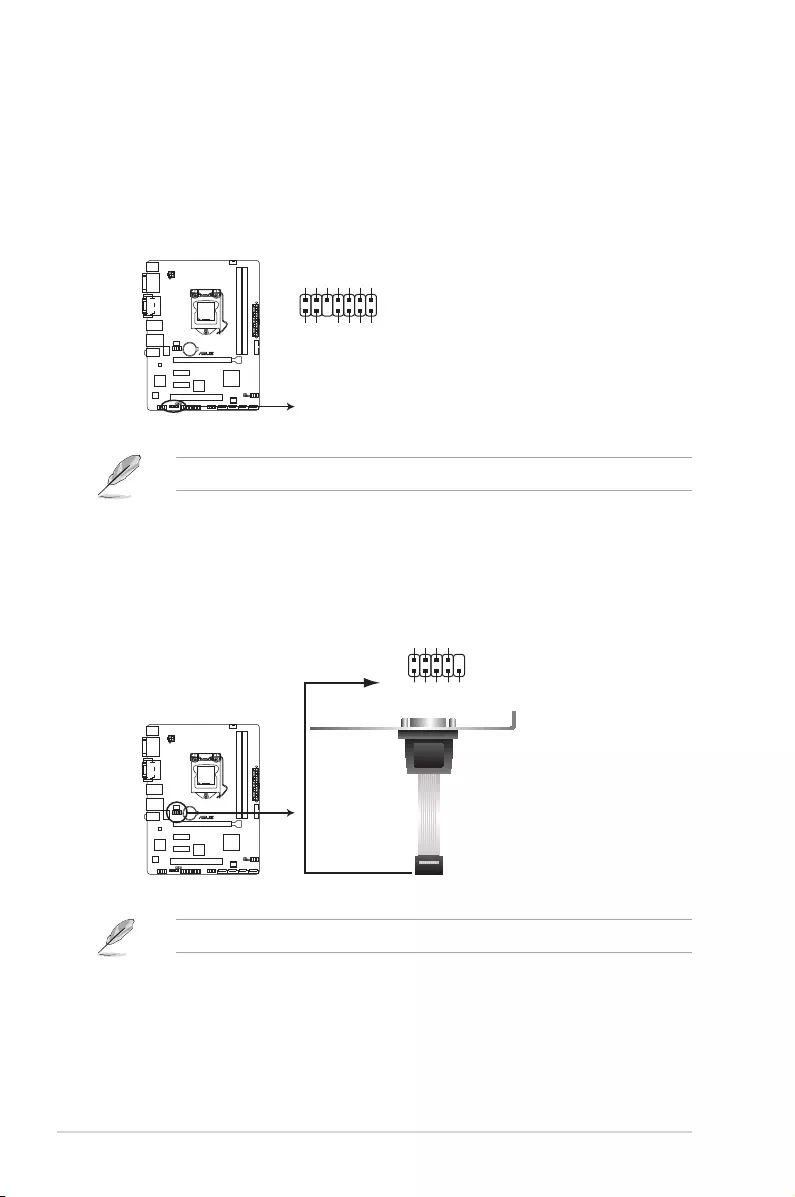
1-18 Chapter 1: Product introduction
10. TPM connector (14-1 pin TPM)
ThisconnectorsupportsaTrustedPlatformModule(TPM)system,whichcansecurely
storekeys,digitalcerticates,passwords,anddata.ATPMsystemalsohelpsenhance
networksecurity,protectsdigitalidentities,andensuresplatformintegrity.
TheTPMmoduleispurchasedseparately.
TPM
H110M-C
H110M-C TPM connector
PIN 1
+3VSB
S_PCIRST#_TBD
GND
C_PCICLK_TPM
+3V
+3V
F_CLKRUN
F_SERIRQ
F_FRAME#
F_LAD3
F_LAD2
F_LAD1
F_LAD0
11. Serial port connector (10-1 pin COM1)
Thisconnectorisforaserial(COM)port.Connecttheserialportmodulecabletothis
connector,theninstallthemoduletoaslotopeningatthebackofthesystemchassis.
TheCOMmoduleispurchasedseparately.
H110M-C
H110M-C Serial port connector
PIN 1
COM1
DCD
TXD
GND
RTS
RI
RXD
DTR
DSR
CTS
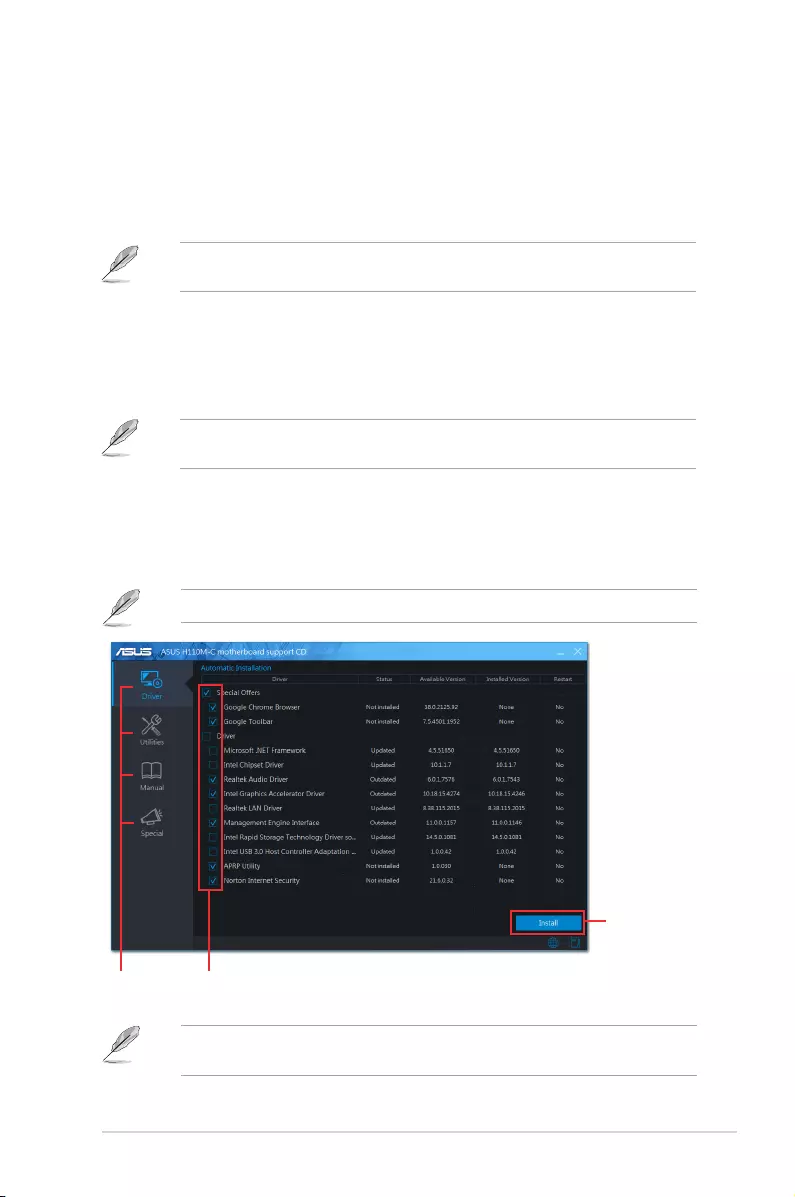
ASUS H110M-C 1-19
1.8 Software support
1.8.1 Installing an operating system
This motherboard supports Windows®7(32-bit/64-bit),Windows®8.1(64-bit)andWindows®
10(64-bit)OperatingSystems(OS).AlwaysinstallthelatestOSversionandcorresponding
updatestomaximizethefeaturesofyourhardware.
Motherboardsettingsandhardwareoptionsvary.RefertoyourOSdocumentationfor
detailed information.
1.8.2 Support DVD information
TheSupportDVDthatcomeswiththemotherboardpackagecontainsthedrivers,software
applications,andutilitiesthatyoucaninstalltoavailallmotherboardfeatures.
ThecontentsoftheSupportDVDaresubjecttochangeatanytimewithoutnotice.Visitthe
ASUSwebsiteatwww.asus.comforupdates.
The following screen is for reference only.
To run the Support DVD
PlacetheSupportDVDintotheopticaldrive.IfAutorunisenabledinyourcomputer,theDVD
automaticallydisplaysthelistsoftheuniquefeaturesofyourASUSmotherboard.Clickthe
Drivers,Utilities,Manual,orSpecial tabstodisplaytheirrespectivemenus.
IfAutorunisNOTenabledinyourcomputer,browsethecontentsoftheSupportDVDto
locatetheleSetup.exeintherootfolder.Double-clicktheSetup.exetoruntheDVD.
Tick an item and click Install
to install it
Click to install
Click an icon to
display a tab

1-20 Chapter 1: Product introduction
1. Insert the Windows
®
7installationDVDintoaUSBODD,orcopyalllesonthe
Windows
®
7installationDVDtoaUSBstoragedeviceonaworkingsystem.
2. ConnecttheUSBODDorUSBstoragedevicetoyour100seriesplatform.
3. InserttheASUSsupportDVDintoaSATAODDonyour100seriesplatform.
4. PoweronyoursystemandpressF8duringPOST(Power-OnSelfTest)toenterthe
boot screen.
Windows® 7 and USB 3.0 driver for 100 Series
Basedonthechipsetspecication,the100seriesrequiresUSB3.0driverstobepreloaded
inordertouseUSBkeyboard/mouseduringWindows
®
7 installation. This section is a guide
onpreloadingUSB3.0driversandinstallingWindows
®
7.
Method 1: Using SATA ODD & USB devices
LoadUSB3.0driversusingtheASUSsupportDVDandinstallWindows
®
7usingaUSB
device.
Requirement:
• 1xASUSsupportDVD
• 1xWindows
®
7 installation source
• 1xSATAODD
• 1xUSBdevice(ODDorstorage)
• TheUSBstoragedevicerequires8GBormorecapacity.Itisrecommendedtoformat
thestoragedevicebeforeuse.
• UsebothaUSBODDandaSATAODDifyouwanttoinstallWindows®764-bitUEFI
mode.
1.9 Installing an operating system
Motherboardsettingsandhardwareoptionsvary.Thesetupprocedurespresentedinthis
chapterareforreferenceonly.RefertoWindows® operating system documentation for
detailed information.
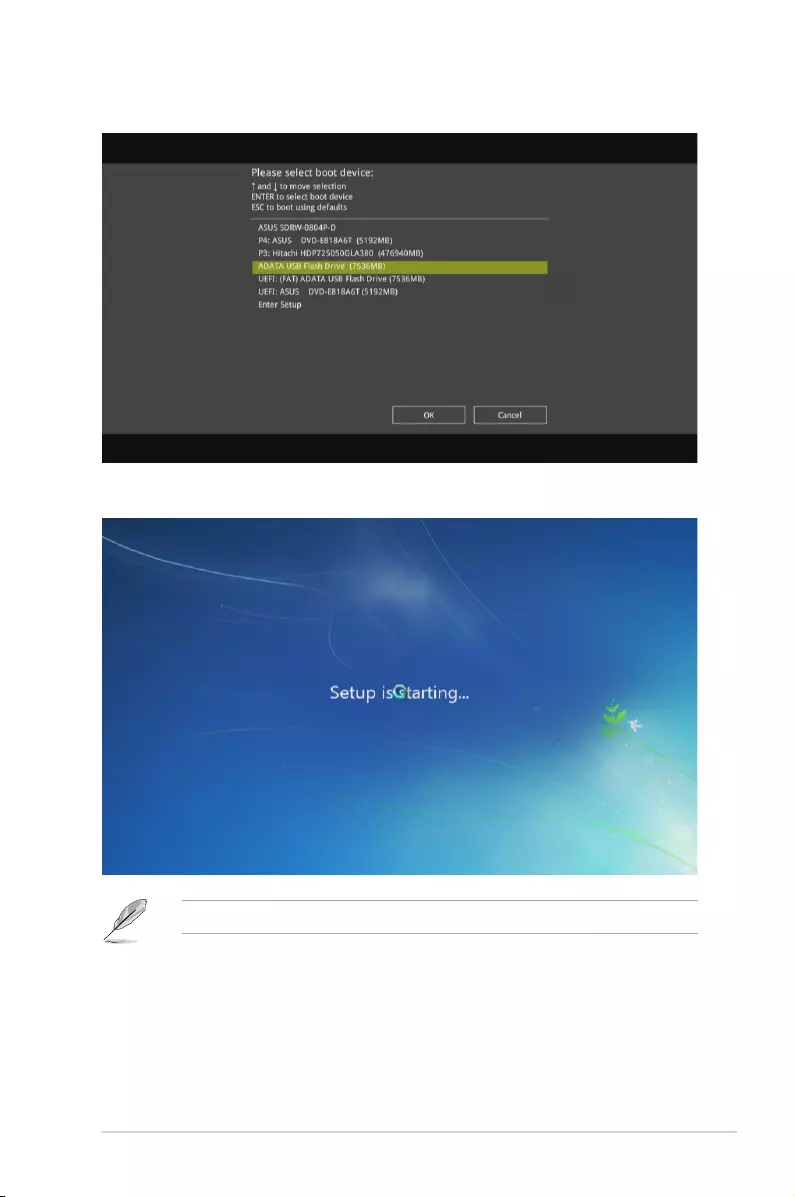
ASUS H110M-C 1-21
6. TheUSB3.0driverwillbeloadedautomaticallyduringinstallationstartup.
The“Setupisstarting...”screenwillshowupiftheUSB3.0driverisloadedcorrectly.
7. Follow the onscreen instructions to complete the Windows
®
7 installation.
5. SelecttheUSBODDorUSBstoragedeviceasthebootdevice.

1-22 Chapter 1: Product introduction
Method2:UsingamodiedWindows® 7 ISO
LoadUSB3.0driversandinstallWindows
®
7usingamodiedWindows
®
7installationDVD.
Requirement:
• 1xASUSsupportDVD
• 1xWindows
®
7 installation source
• 1xWorkingsystem(PCornotebook)
• 1xSATAODD
1. Onyourworkingsystem,createanISOimageleoftheWindows
®
7 installation
sourceusingathird-partyISOsoftware.
2. Copyboth“Auto_Unattend.xml”and“Auto_Unattend”folderfromtherootdirectoryof
theASUSsupportingDVDtoyoursystem.
3. EdittheISOleandaddboth“Auto_Unattend.xml”and“Auto_Unattend”folderintothe
ISOle.
4. BurnthisISOleontoanemptyDVDtocreateamodiedWindows
®
7 installation
DVD.
5. InsertthemodiedWindows
®
7installationDVDintoanODDonyour100series
platform.
6. PoweronyoursystemandpressF8duringPOST(Power-OnSelfTest)toenterthe
boot screen.
7. SelecttheODDasthebootdevice.
8. TheUSB3.0driverwillbeloadedautomaticallyduringinstallationstartup.
The“Setupisstarting...”screenwillshowupiftheUSB3.0driverisloadedcorrectly.
9. Follow the onscreen instructions to complete the Windows
®
7 installation.
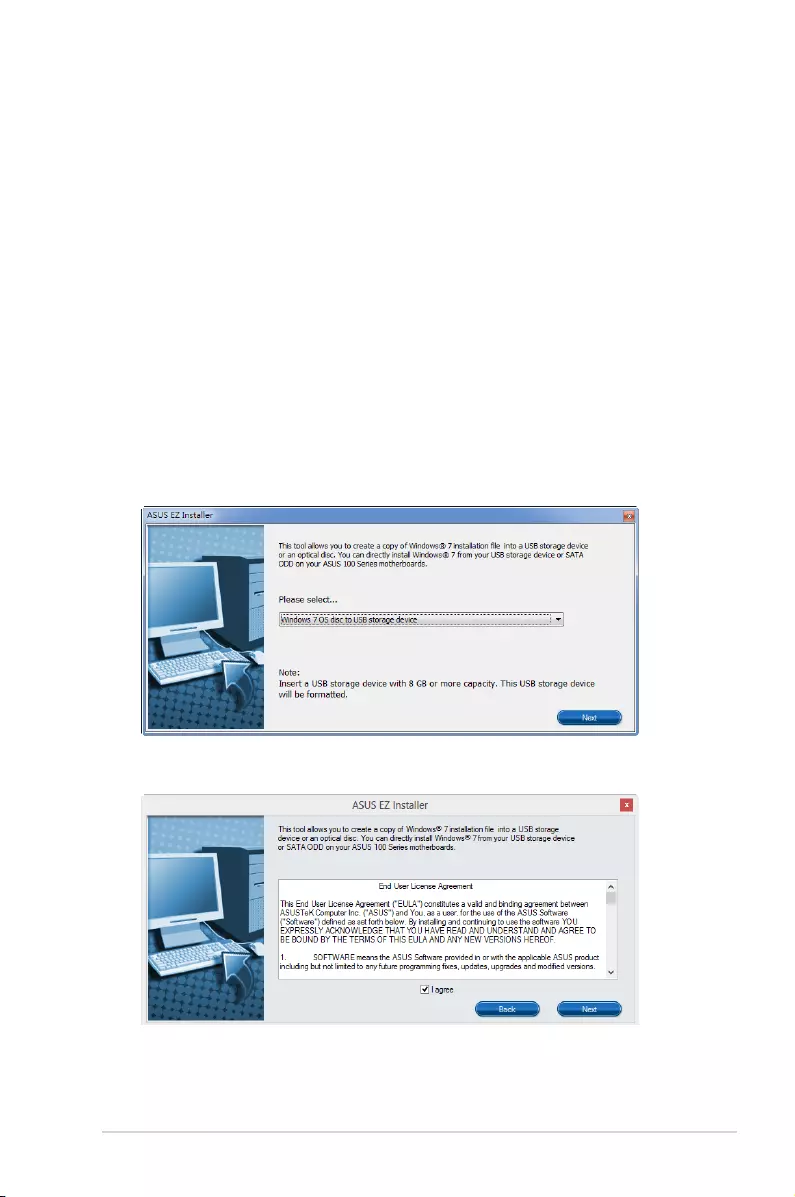
ASUS H110M-C 1-23
Method 3: Using ASUS EZ Installer
UsetheASUSEZInstallertocreateamodiedWindows
®
7 installation source.
Requirement:
• 1xASUSsupportDVD
• 1xWindows
®
7installationDVD
• 1xWorkingsystem(PCornotebook)
• 1xSATAODD
• 1xUSBstoragedevice(8GBormore)
1. Insert the Windows
®
7installationDVD.
2. LaunchtheASUSEZInstallerlocatedontheASUSsupportDVD.
3. SelectamethodofcreatingamodiedWindows
®
7installationle:
• Windows
®
7OSdisktoUSBstoragedevice
-SelectWindows 7 OS disk to USB storage device then click Next.
- Check I agree and then click Next.
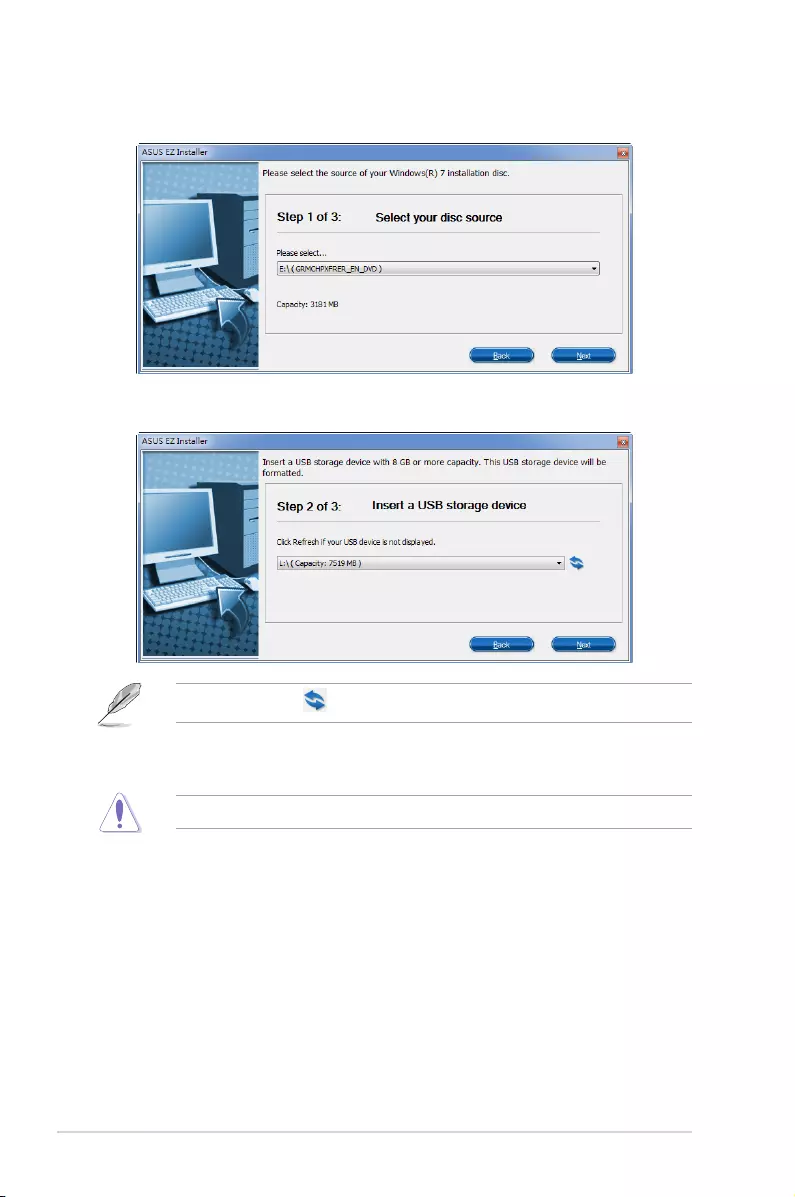
1-24 Chapter 1: Product introduction
-SelectthesourceoftheWindows
®
7 installation disk then click Next.
-SelecttheUSBstoragedeviceandclicknext.
Click the refresh icon iftheUSBstoragedeviceisnotdisplayed.
- Click YestoclearthecontentsontheUSBstoragedeviceandcreatea
bootableUSBdevice.
MakesuretobackupcontentsontheUSBstoragedevice,asitwillbeformatted.
-Oncecompleted,clickOKtonish.

ASUS H110M-C 1-25
• Windows
®
7OSdisktoISOle
BeforeusingthismethodtoinstallWindows
®
7:
• IfyouareusingonlyoneSATAHDD,ensurethatyourSATAHDDhasmorethan
twicethestoragespace(ISOlesize+500MB).
• IfyouareusingtwoormoreSATAHDDs,ensurethatatleasttwoofyourSATA
HDDshavemorethanthestoragespace(ISOlesize+500Mb).
-SelectWindows7OSdisktoISOle then click Next.
-SelectthesourceoftheWindows
®
7 installation disk then click Next.
- Check I agree and then click Next.

1-26 Chapter 1: Product introduction
-SelectthefoldertosavethemodiedWindows
®
7installationISOleandclick
Next.
-Oncecompleted,clickOKtonish.
-BurnthisISOleontoanemptyDVDtocreateamodiedWindows
®
7
installationDVD.
4. InsertthemodiedWindows
®
7installationDVDintoanODDorconnecttheUSB
storagedevicewithmodiedWindows
®
7installationlesontoyour100series
platform.
5. PoweronyoursystemandpressF8duringPOST(Power-OnSelfTest)toenterthe
boot screen.
6. SelecttheODDorUSBstoragedeviceasthebootdevice.
7. TheUSB3.0driverwillbeloadedautomaticallyduringinstallationstartup.
The“Setupisstarting...”screenwillshowupiftheUSB3.0driverisloadedcorrectly.
8. Follow the onscreen instructions to complete the Windows
®
7 installation.

2.1 Managing and updating your BIOS
Save a copy of the original motherboard BIOS le to a USB ash disk in case you need
to restore the BIOS in the future. Copy the original motherboard BIOS using the ASUS
Update utility.
2.1.1 EZ Update
EZ Update is a utility that allows you to automatically update your motherboard’s softwares,
drivers and the BIOS version easily. With this utility, you can also manually update the saved
BIOS and select a boot logo when the system goes into POST.
To launch EZ Update, click EZ Update on the AI Suite 3 main menu bar.
BIOS information
2
EZ Update requires an Internet connection either through a network or an ISP (Internet
Service Provider).
Click to automatically
update your
motherboard’s driver,
software and rmware
Click to nd and
select the BIOS
from le
Click to select
a boot logo Click to
update the
BIOS
ASUS H110M-C 2-1

2.1.2 ASUS EZ Flash 3
The ASUS EZ Flash 3 feature allows you to update the BIOS without using an OS‑based
utility.
• Ensure to load the BIOS default settings to ensure system compatibility and stability.
Select the Load Optimized Defaults item under the Exit menu. See section 2.10 Exit
Menu for details.
• Check your local Internet connection before updating through the Internet.
To update the BIOS using EZ Flash 3:
1. Enter the Advanced Mode of the BIOS setup program. Go to the Tool menu to select
ASUS EZ Flash 3 and press <Enter> to enable it.
2. Follow the steps below to update the BIOS via a storage device or Internet.
Via a storage device
a) Insert the USB ash disk that contains the latest BIOS le to the USB port, then
select Storage Device.
b) Press <Tab> to switch to the Drive eld.
c) Press the Up/Down arrow keys to nd the USB ash disk that contains the latest
BIOS, and then press <Enter>.
d) Press <Tab> to switch to the Folder Info eld.
e) Press the Up/Down arrow keys to nd the BIOS le, and then press <Enter> to
perform the BIOS update process.
Via the Internet
a) Select via Internet.
b) Press the Left/Right arrow keys to select an Internet connection method, and then
press <Enter>.
c) Follow the onscreen instructions to complete the update.
3. Reboot the system when the update process is done.
2-2 Chapter 2: Getting started

2.1.3 ASUS CrashFree BIOS 3 utility
The ASUS CrashFree BIOS 3 is an auto recovery tool that allows you to restore the BIOS le
when it fails or gets corrupted during the updating process. You can restore a corrupted BIOS
le using the motherboard support DVD or a USB ash drive that contains the updated BIOS
le.
• Before using this utility, rename the BIOS le in the removable device into H110MC.
CAP.
• The BIOS le in the support DVD may not be the latest version. Download the latest
BIOS le from the ASUS website at www.asus.com.
Recovering the BIOS
To recover the BIOS:
1. Turn on the system.
2. Insert the support DVD to the optical drive or the USB ash drive that contains the
BIOS le to the USB port.
3. The utility automatically checks the devices for the BIOS le. When found, the utility
reads the BIOS le and enters ASUS EZ Flash 3 utility automatically.
4. The system requires you to enter BIOS Setup to recover BIOS settings. To ensure
system compatibility and stability, we recommend that you press <F5> to load default
BIOS values.
DO NOT shut down or reset the system while updating the BIOS! Doing so can cause
system boot failure!
2.1.4 ASUS BIOS Updater
ASUS BIOS Updater allows you to update the BIOS in DOS environment.
The screen captures used in this section are for reference only and may not be exactly the
same as actually shown on your computer screen.
Before updating BIOS
• Prepare the motherboard support DVD and a USB ash drive.
• Download the latest BIOS le and BIOS Updater from http://support.asus.com and
save them in your USB ash drive.
• ASUS EZ Flash 3 supports USB devices, such as a USB ash disk, with FAT 32/16
format and single partition only.
• DO NOT shut down or reset the system while updating the BIOS to prevent system
boot failure!.
ASUS H110M-C 2‑3

Booting the system in DOS environment
To boot the system in DOS:
1. Insert the USB ash drive with the latest BIOS le and BIOS Updater to the USB port.
2. Boot your computer then press <F8> to launch the select boot device screen.
3. When the select boot device screen appears, insert the Support DVD into the optical
drive then select the optical drive as the boot device.
Please select boot device:
and to move selection
ENTER to select boot device
ESC to boot using defaults
P2: ST3808110AS (76319MB)
aigo miniking (250MB)
UEFI: (FAT) ASUS DRW-2014L1T(4458MB)
P1: ASUS DRW-2014L1T(4458MB)
UEFI: (FAT) aigo miniking (250MB)
Enter Setup
4. When the booting message appears, press <Enter> within ve (5) seconds to enter
FreeDOS prompt.
Welcome to FreeDOS (http://www.freedos.org)!
C:/> d:
D:/>
5. On the FreeDOS prompt, type d: then press <Enter> to switch the disk from Drive C
(optical drive) to Drive D (USB ash drive).
ISOLINUX 3.20 2006-08-26 Copyright (C) 1994-2005 H. Peter Anvin
A Bootable DVD/CD is detected. Press ENTER to boot from the DVD/CD.
If no key is pressed within 5 seconds, the system will boot next priority
device automatically. boot:
Updating the BIOS le
To update the BIOS le:
1. On the FreeDOS prompt, type bupdater /pc /g and press <Enter>.
D:/> bupdater /pc /g
NTFS is not supported under FreeDOS environment. Ensure that your USB ash drive is in
single partition and in FAT32/16 format.
• Turn off the computer.
• Ensure that your computer has a DVD optical drive.
2-4 Chapter 2: Getting started

2. On the BIOS Updater screen, press <Tab> to switch from Files panel to Drives panel
then select D:.
ASUSTeK BIOS Updater for DOS V1.30 [2014/01/01]
Current ROM
BOARD: H110M-C
VER: 0305 (H :00 B :00)
DATE: 8/20/2015
Update ROM
BOARD: Unknown
VER: Unknown
DATE: Unknown
PATH: C:\
C:
D:
FORMAN~1 <DIR>
H110MC.CAP 16779264 2015-08-20 21:14:34
Note
[Enter] Select or Load [Tab] Switch [V] Drive Info
[Up/Down/Home/End] Move [Esc] Exit
Files
panel
Drives
panel
3. Press <Tab> to switch from Drives panel to Files panel then press <Up/Down or Home/
End> keys to select the BIOS le and press <Enter>.
4. After the BIOS Updater checks the selected BIOS le, select Yes to conrm the BIOS
update.
Are you sure you want to update the BIOS?
Yes No
The BIOS Backup feature is not supported due to security regulations.
5. Select Yes then press <Enter>. When BIOS update is done, press <ESC> to exit BIOS
Updater.
6. Restart your computer.
DO NOT shut down or reset the system while updating the BIOS to prevent system boot
failaure.
Ensure to load the BIOS default settings to ensure system compatibility and stability. Select
the Load Optimized Defaults item under the Exit BIOS menu. See section 2.10 Exit
Menu for details.
ASUS H110M-C 2‑5

2.2 BIOS setup program
Use the BIOS Setup program to update the BIOS or congure its parameters. The BIOS
screens include navigation keys and brief online help to guide you in using the BIOS Setup
program.
Entering BIOS Setup at startup
To enter BIOS Setup at startup:
Press <Delete> or <F2> during the Power‑On Self Test (POST). If you do not press <Delete>
or <F2>, POST continues with its routines.
Entering BIOS Setup after POST
To enter BIOS Setup after POST:
Press <Ctrl>+<Alt>+<Del> simultaneously.
Press the reset button on the system chassis.
Press the power button to turn the system off then back on. Do this option only if you failed to
enter BIOS Setup using the rst two options.
Using the power button, reset button, or the <Ctrl>+<Alt>+<Del> keys to force reset from a
running operating system can cause damage to your data or system. We recommend you
always shut down the system properly from the operating system.
• The BIOS setup screens shown in this section are for reference purposes only, and
may not exactly match what you see on your screen.
• Visit the ASUS website at www.asus.com to download the latest BIOS le for this
motherboard.
• Ensure that a mouse is connected to your motherboard if you want to use the mouse
to control the BIOS setup program.
• If the system becomes unstable after changing any BIOS setting, load the default
settings to ensure system compatibility and stability. Select the Load Optimized
Defaults item under the Exit menu or press hotkey F5. See section 2.10 Exit Menu
for details.
• If the system fails to boot after changing any BIOS setting, try to clear the CMOS and
reset the motherboard to the default value. See section 1.6 Headers and Jumpers for
information on how to erase the RTC RAM.
BIOS menu screen
The BIOS setup program can be used under two modes: EZ Mode and Advanced Mode.
Press <F7> to change between the two modes.
2‑6 Chapter 2: Getting started
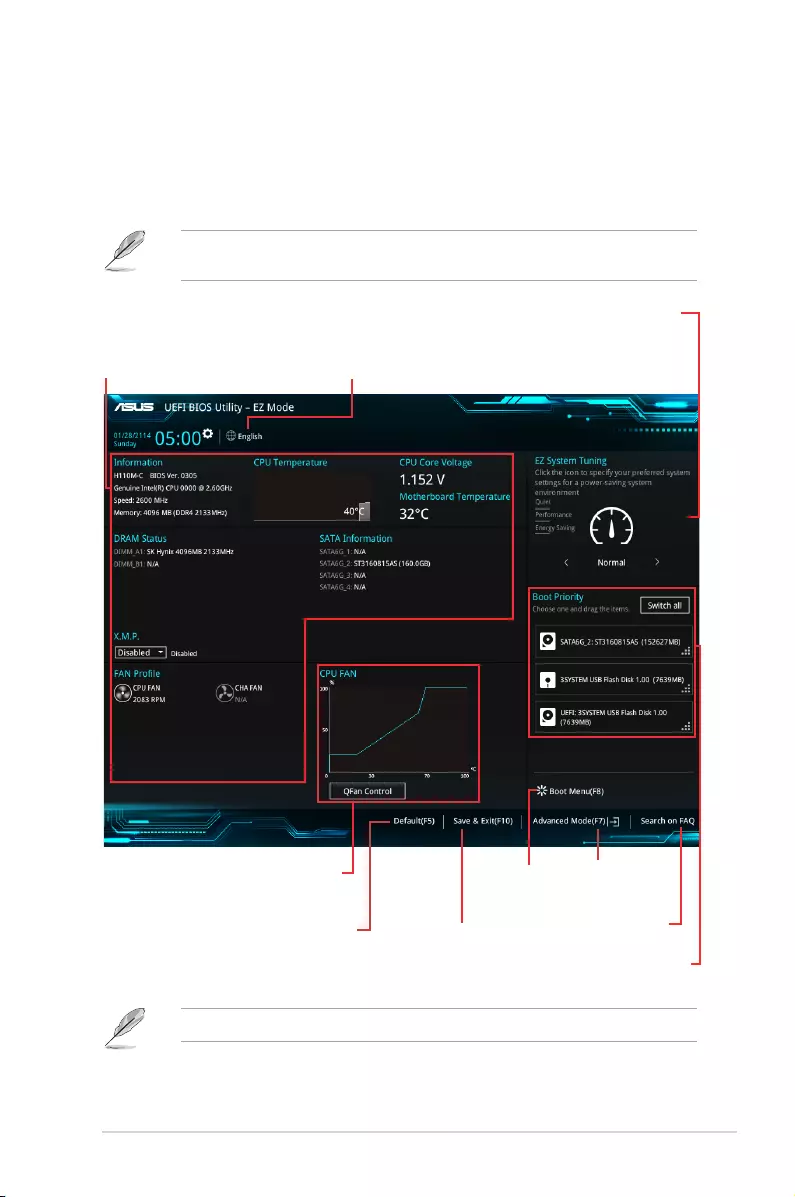
2.2.1 EZ Mode
By default, the EZ Mode screen appears when you enter the BIOS setup program. The EZ
Mode provides you an overview of the basic system information, and allows you to select the
display language, system performance mode, fan prole and boot device priority. To access
the Advanced Mode, click Advanced Mode(F7) or press <F7>.
The default screen for entering the BIOS setup program can be changed. Refer to the
Setup Mode item in section 2.8 Boot menu for details.
The boot device options vary depending on the devices you installed to the system.
Saves the changes
and resets the
system
Selects the display
language of the BIOS
setup program
Displays the CPU/motherboard
temperature, CPU voltage output,
CPU/chassis fan speed, and SATA
information
Displays the system properties of
the selected mode. Click <Enter> to
switch EZ System Tuning modes
Displays the
Advanced mode
menus
Selects the boot
device priority
Loads optimized
default settings
Shows the
bootable
devices
Displays the CPU Fan’s speed.
Click the button to manually
tune the fans
Searches FAQ
ASUS H110M-C 2‑7
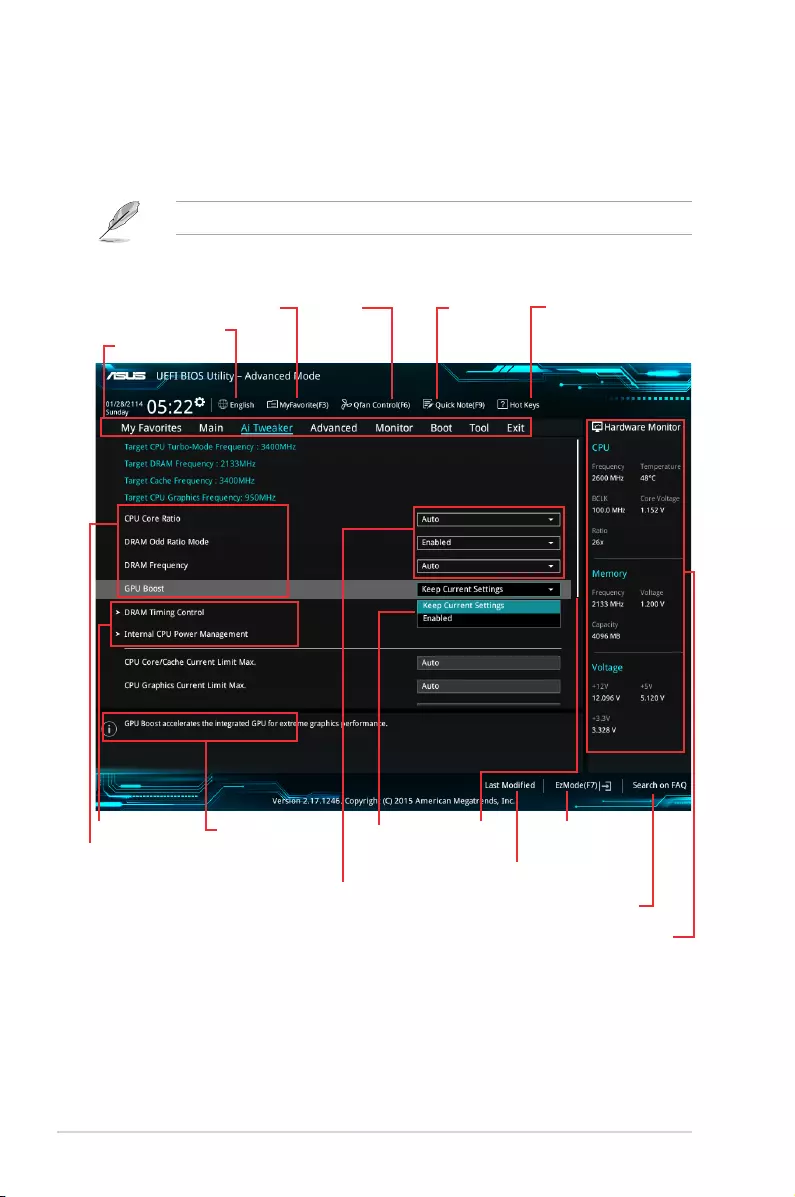
Conguration
elds
Menu bar
General helpSub-menu item
Menu items
Scroll bar Goes back to
EZ Mode
Last modied
settings
Language
Hot Keys
MyFavorite Q-Fan
control
Searches FAQ
Displays the CPU/motherboard
temperature, CPU and memory
voltage output
Quick Note
2.2.2 Advanced Mode
The Advanced Mode provides advanced options for experienced end‑users to congure the
BIOS settings. The gure below shows an example of the Advanced Mode. Refer to the
following sections for the detailed congurations.
To access the EZ Mode, click EzMode(F7) or press <F7>.
Popup Window
2‑8 Chapter 2: Getting started

Menu items
The highlighted item on the menu bar displays the specic items for that menu. For example,
selecting Main shows the Main menu items.
The other items (My Favorites, Ai Tweaker, Advanced, Monitor, Boot, Tool, and Exit) on the
menu bar have their respective menu items.
Submenu items
A greater than sign (>) before each item on any menu screen means that the item has a
submenu. To display the submenu, select the item and press <Enter>.
Language
This button above the menu bar contains the languages that you can select for your BIOS.
Click this button to select the language that you want to display in your BIOS screen.
MyFavorites (F3)
This button above the menu bar shows all BIOS items in a Tree Map setup. Select frequently‑
used BIOS settings and save it to MyFavorites menu.
Refer to section 2.3 My Favorites for more information.
Q-Fan Control (F6)
This button above the menu bar displays the current settings of your fans. Use this button to
manually tweak the fans to your desired settings.
Refer to section 2.2.3 QFan Control for more information.
Quick Note (F9)
This button above the menu bar allows you to key in notes of the activities that you have
done in BIOS.
• The Quick Note function does not support the following keyboard functions: delete,
cut, copy and paste.
• You can only use the alphanumeric characters to enter your notes.
Menu bar
The menu bar on top of the screen has the following main items:
My Favorites For saving the frequently‑used system settings and conguration
Main For changing the basic system conguration
Ai Tweaker For changing the overclocking settings
Advanced For changing the advanced system settings
Monitor For displaying the system temperature, power status, and changing the fan settings
Boot For changing the system boot conguration
Tool For conguring options for special functions
Exit For selecting the exit options and loading default settings
ASUS H110M-C 2-9
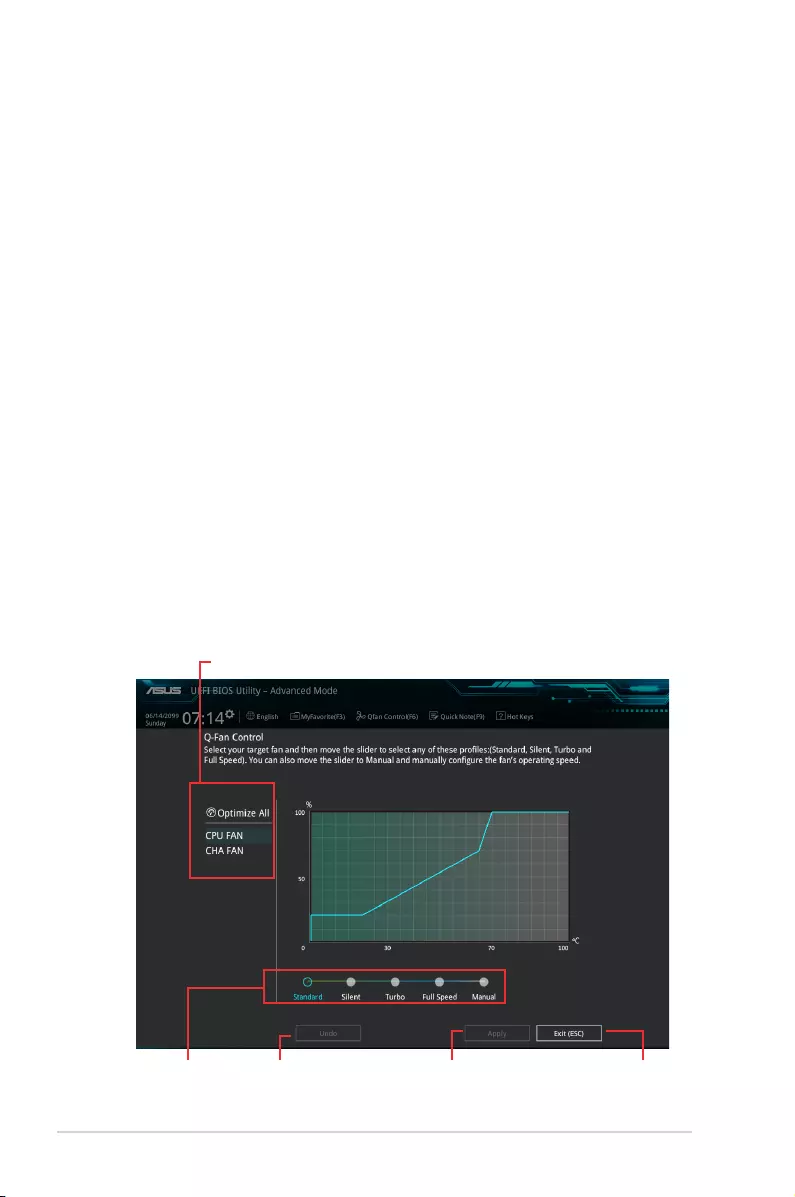
Hot keys
This button above the menu bar contains the navigation keys for the BIOS setup program.
Use the navigation keys to select items in the menu and change the settings.
Scroll bar
A scroll bar appears on the right side of a menu screen when there are items that do not t
on the screen. Press the Up/Down arrow keys or <Page Up> / <Page Down> keys to display
the other items on the screen.
General help
At the top right corner of the menu screen is a brief description of the selected item. Use
<F12> key to capture the BIOS screen and save it to the removable storage device.
Conguration elds
These elds show the values for the menu items. If an item is user‑congurable, you can
change the value of the eld opposite the item. You cannot select an item that is not
user‑congurable.
A congurable eld is highlighted when selected. To change the value of a eld, select it and
press <Enter> to display a list of options.
Last Modied button
This button shows the items that you last modied and saved in BIOS Setup.
2.2.3 QFan Control
The QFan Control allows you to set a fan prole or manually congure the operating speed of
your CPU and chassis fans.
Click to select a fan to be congured
Click to undo
the changes
Click to apply
the fan setting
Click to go back
to main menu
Select a prole to
apply to your fans
2-10 Chapter 2: Getting started
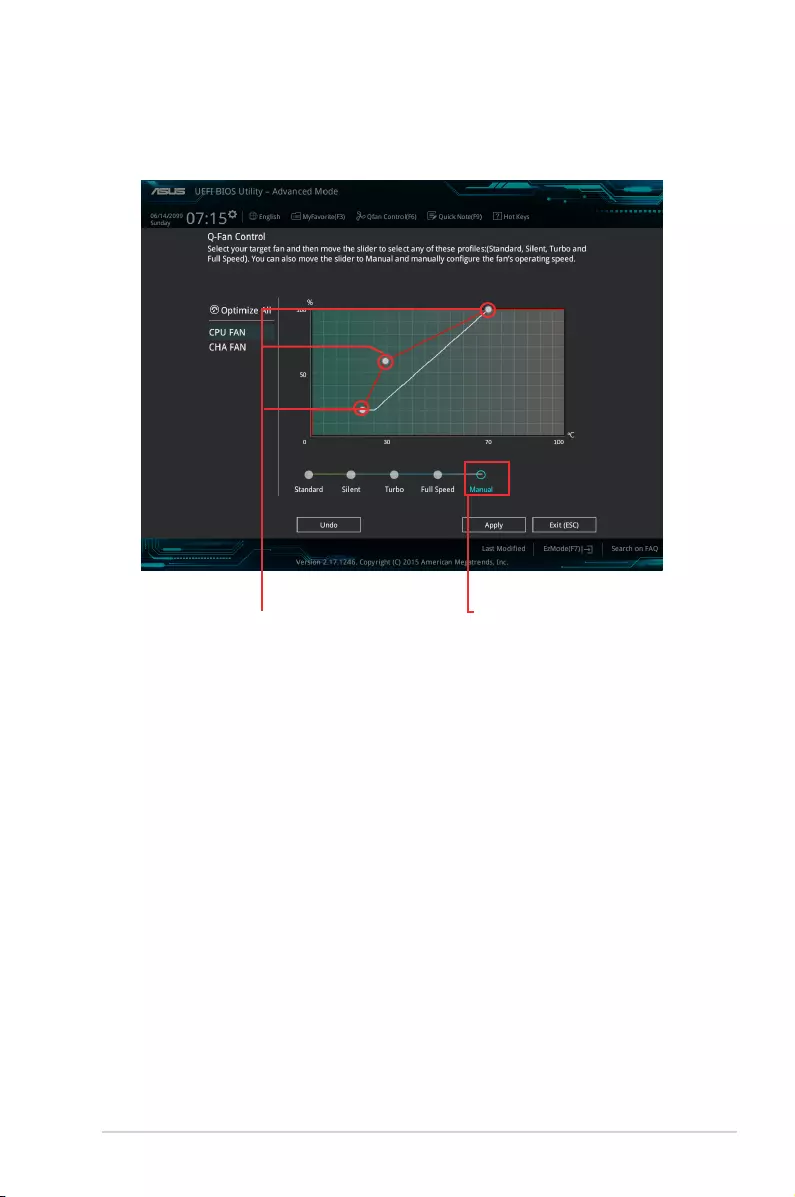
Conguring fans manually
Select Manual from the list of proles to manually congure your fans’ operating speed.
To congure your fans:
1. Select the fan that you want to congure and to view its current status.
2. Click and drag the speed points to adjust the fans’ operating speed.
3. Click Apply to save the changes then click Exit (ESC).
Speed points Click to manually
congure your fans
ASUS H110M-C 2-11
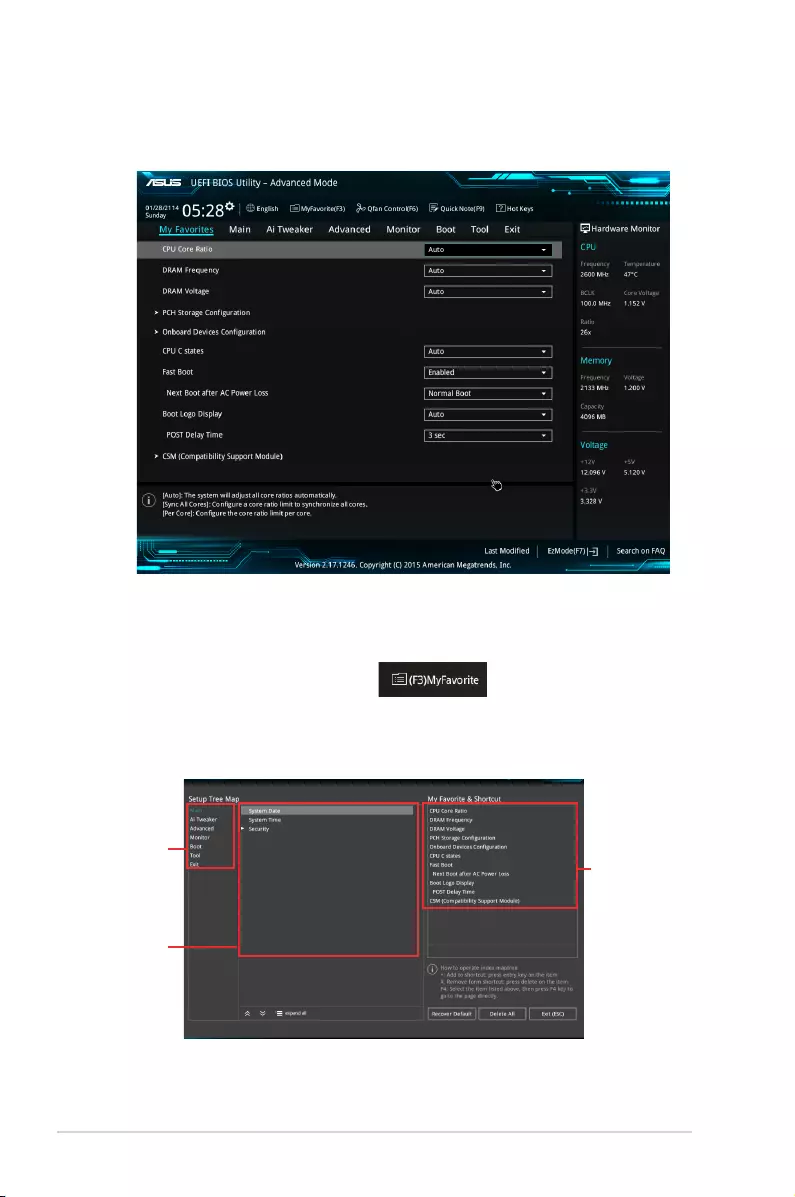
2.3 My Favorites
MyFavorites is your personal space where you can easily save and access your favorite
BIOS items.
Adding items to My Favorites
To add BIOS items:
1. Press <F3> on your keyboard or click from the BIOS screen to open
Setup Tree Map screen.
2. On the Setup Tree Map screen, select the BIOS items that you want to save in
MyFavorites screen.
Main menu
panel
Submenu
panel
Selected
shortcut items
2-12 Chapter 2: Getting started
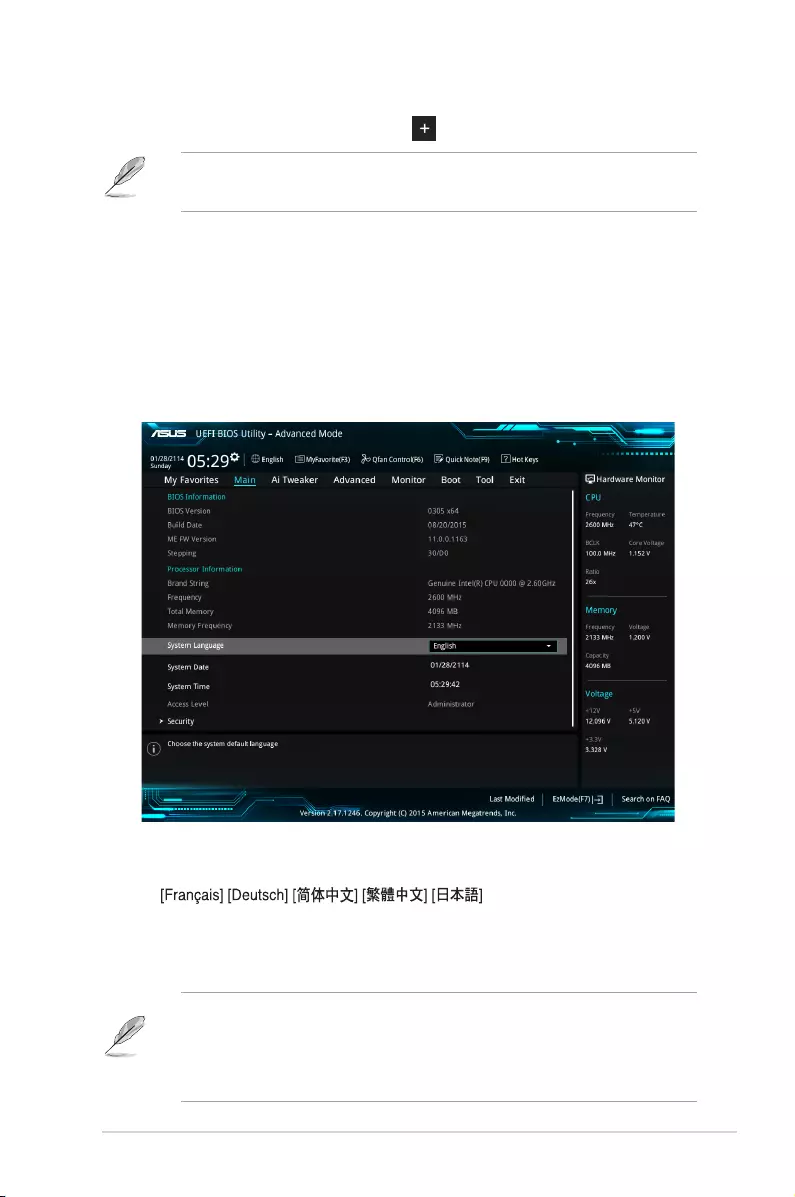
Language [English]
Allows you to choose the BIOS language version from the options. Conguration options:
[English] [Español] [Русский] [
Korean]
Security
The Security menu items allow you to change the system security settings.
• If you have forgotten your BIOS password, erase the CMOS Real Time Clock (RTC)
RAM to clear the BIOS password. See section 1.6 Headers and Jumpers for
information on how to erase the RTC RAM.
• The Administrator or User Password items on top of the screen show the default
Not Installed. After you set a password, these items show Installed.
2.4 Main menu
The Main menu screen appears when you enter the Advanced Mode of the BIOS Setup
program. The Main menu provides you an overview of the basic system information, and
allows you to set the system date, time, language, and security settings.
3. Select an item from main menu panel, then click the submenu that you want to save as
favorite from the submenu panel and click .
You cannot add the following items to My Favorite items:
• User‑managed items such as language and boot order
4. Click Exit (ESC) or press <esc> key to close Setup Tree Map screen.
5. Go to My Favorites menu to view the saved BIOS items.
ASUS H110M-C 2‑13

Administrator Password
If you have set an administrator password, we recommend that you enter the administrator
password for accessing the system.
To set an administrator password:
1. Select the Administrator Password item and press <Enter>.
2. From the Create New Password box, key in a password, then press <Enter>.
3. From the Conrm New Password box, key in your password again to conrm the
password, then click OK.
To change an administrator password:
1. Select the Administrator Password item and press <Enter>.
2. From the Enter Current Password box, key in the current password, then press
<Enter>.
3. From the Create New Password box, key in a new password, then press <Enter>.
4. From the Conrm New Password box, key in your password again to conrm the
password, then click OK.
To clear the administrator password, follow the same steps as in changing an administrator
password, but click OK when prompted to create/conrm the password. After you clear the
password, the Administrator Password item on top of the screen shows Not Installed.
User Password
If you have set a user password, you must enter the user password for accessing the system.
The User Password item on top of the screen shows the default Not Installed. After you set
a password, this item shows Installed.
To set a user password:
1. Select the User Password item and press <Enter>.
2. From the Create New Password box, key in a password, then press <Enter>.
3. From the Conrm New Password box, key in your password again to conrm the
password, then click OK.
To change a user password:
1. Select the User Password item and press <Enter>.
2. From the Enter Current Password box, key in the current password, then press
<Enter>.
3. From the Create New Password box, key in a new password, then press <Enter>.
4. From the Conrm New Password box, key in your password again to conrm the
password, then click OK.
To clear the user password, follow the same steps as in changing a user password, but click
OK when prompted to create/conrm the password. After you clear the password, the User
Password item on top of the screen shows Not Installed.
2-14 Chapter 2: Getting started
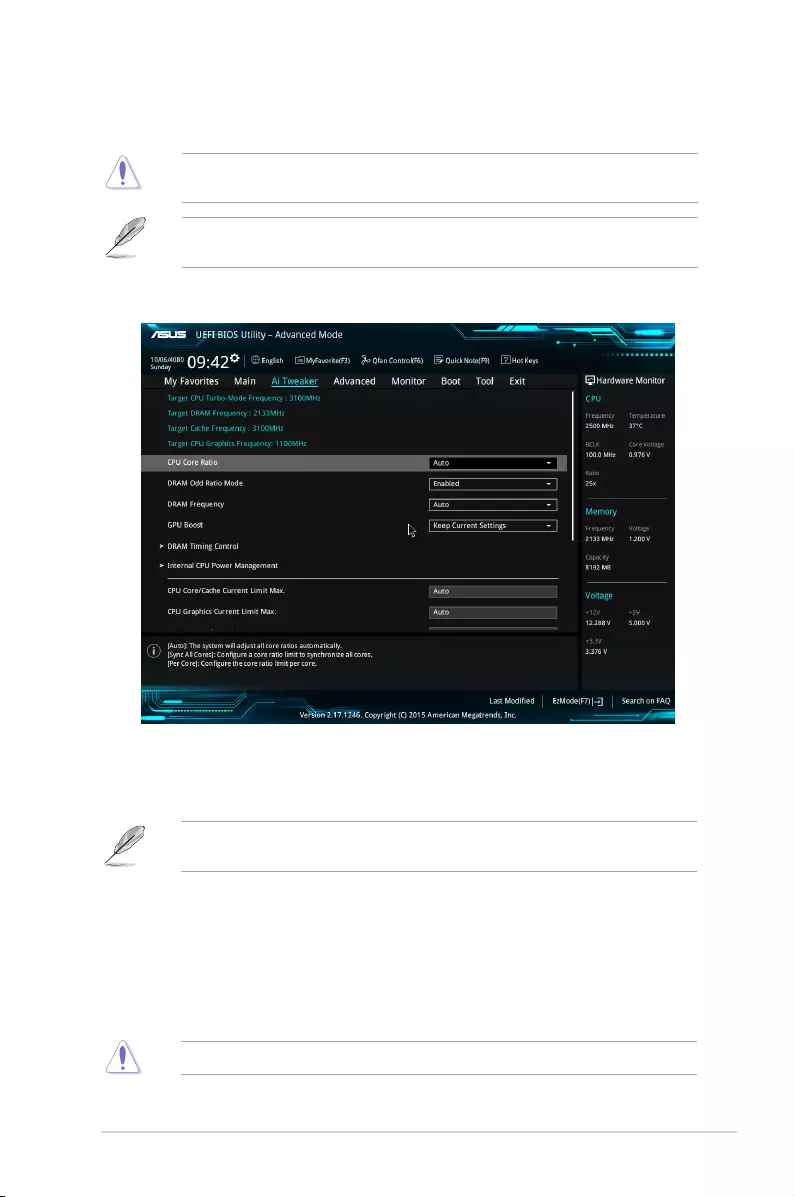
2.5 Ai Tweaker menu
The Ai Tweaker menu items allow you to congure overclocking‑related items.
Be cautious when changing the settings of the Ai Tweaker menu items. Incorrect eld
values can cause the system to malfunction.
The conguration options for this section vary depending on the CPU and DIMM model you
installed on the motherboard.
Scroll down to display other BIOS items.
CPU Core Ratio [Auto]
This item allows you to set the CPU core ratio limit per core or synchronize automatically to
all cores. Conguration options: [Auto] [Sync All Cores] [Per Core]
When the CPU Core Ratio is set to [Sync All Cores] or [Per Core], the following items
appear.
1-Core Ratio Limit [Auto]
Select [Auto] to apply the CPU default Turbo Ratio setting or manually assign a 1‑Core Limit
value that must be higher than or equal to the 2‑Core Ratio Limit.
2-Core Ratio Limit [Auto]
Select [Auto] to apply the CPU default Turbo Ratio setting or manually assign a 2‑Core Limit
value that must be higher than or equal to the 3‑Core Ratio Limit.
If you assign a value for 2‑Core Ratio Limit, do not set the 1‑Core Ratio Limit to [Auto].
ASUS H110M-C 2‑15

3-Core Ratio Limit [Auto]
Select [Auto] to apply the CPU default Turbo Ratio setting or manually assign a 3‑Core Limit
value that must be higher than or equal to the 4‑Core Ratio Limit.
If you assign a value for 3‑Core Ratio Limit, do not set the 1‑Core Ratio Limit and 2‑Core
Ratio Limit to [Auto].
4-Core Ratio Limit [Auto]
Select [Auto] to apply the CPU default Turbo Ratio setting or manually assign a 4‑Core Limit
value that must be lower than or equal to the 3‑Core Ratio Limit.
If you assign a value for 4‑Core Ratio Limit, do not set the 1‑Core Ratio Limit, 2‑Core Ratio
Limit, and 3‑Core Ratio to [Auto].
BCLK Frequency: DRAM Frequency Ratio [Auto]
Allows you to set the CPU bus speed to DRAM speed ratio mode.
[Auto] DRAM speed is set to the optimized settings.
[100:133] The BCLK frequency to DRAM speed ratio is set to 100:133.
[100:100] The BCLK frequency to DRAM speed ratio is set to 100:100.
DRAM Odd Ratio Mode [Enabled]
Allows you to enable or disable the Odd Ratio Mode, which provides better granularity.
Conguration options: [Disabled] [Enabled]
DRAM Frequency [Auto]
This item allows you to set the memory operating frequency. The congurable options vary
with the BCLK (base clock) frequency setting. Select the auto mode to apply the optimized
setting. Conguration options: [DDR4‑800MHz] [DDR4‑933MHz] [DDR4‑1066MHz] [DDR4‑
1200MHz] [DDR4‑1333MHz] ~ [DDR4‑4133MHz] [DDR4‑4266MHz]
Selecting a very high memory frequency may cause the system to become unstable! If this
happens, revert to the default setting.
GPU Boost [Keep Current Settings]
Allows you to enable the GPU Boost to accelerate the integrated GPU for extreme graphics
performance. Conguration options: [Keep Current Settings] [Enabled]
DRAM Timing Control
The subitems in this menu allow you to set the DRAM timing control features. Use the
<+> and <‑> keys to adjust the value. To restore the default setting, type [auto] using the
keyboard and press the <Enter> key.
Changing the values in this menu may cause the system to become unstable! If this
happens, revert to the default settings.
2‑16 Chapter 2: Getting started

Internal CPU Power Management
The subitems in this menu allow you to set the CPU ratio and features.
Intel® SpeedStepTM [Auto]
This item allows the operating system to dynamically adjust the processor voltage and cores
frequency, resulting to a decreased average power consumption and decreased average
heat production. Conguration options: [Disabled] [Enabled] [Auto]
Turbo Mode [Enabled]
This item allows you to automatically set the CPU cores to run faster than the base operating
frequency when it is below the operating power, current and temperature specication limit.
Conguration options: [Enabled] [Disabled]
Turbo Mode is only available on selected CPU models only.
Turbo Mode Parameters
Long Duration Package Power Limit [Auto]
Allows you to limit the turbo ratio’s long duration package power.
Use the <+> and <‑> keys to adjust the value.
Package Power Time Window [Auto]
Allows you to set the package power time window.
Use the <+> and <‑> keys to adjust the value.
Short Duration Package Power Limit [Auto]
Allows you to limit the turbo ratio’s long duration power.
Use the <+> and <‑> keys to adjust the value.
IA/AC Load Line [Auto]
Allows you to limit the AC Loadline in 1/100 mOhms. Use <+> and <‑> key to adjust the
value.
IA/DC Load Line [Auto]
Allows you to limit the DC Loadline in 1/100 mOhms. Use <+> and <‑> key to adjust the
value.
CPU Core/Cache Current Limit Max. [Auto]
Allows you to congure a higher current limit to prevent a frequency or power throttling when
overclocking. The values range from 0.00A to 255.50A with a 0.25A interval.
CPU Graphics Current Limit Max. [Auto]
Allows you to congure a higher current limit to prevent a frequency or power throttling when
overclocking. The values range from 0.00A to 255.50A with a 0.25A interval.
Min. CPU Cache Ratio [Auto]
Allows you to congure the minimum possible CPU cache ratio. Use the <+> or <‑> keys to
adjust the value. The values range from 8 to 34 with a 1 interval.
ASUS H110M-C 2‑17

Max. CPU Cache Ratio [Auto]
Allows you to congure the maximum possible CPU cache ratio. Use the <+> or <‑> keys to
adjust the value. The values range from 8 to 34 with a 1 interval.
Max. CPU Graphics Ratio [Auto]
Allows you to congure the maximum CPU graphics ratio. Use the <+> or <‑> keys to adjust
the value. The values range from 1 to 60 with a 1 interval.
DRAM Voltage [Auto]
This item allows you to set the voltage for the DRAM. Conguration options: [Auto] [1.20V]
[1.25V] [1.32V] [1.35V] [1.36V] [1.39V] [1.46V] [1.50V]
CPU System Agent Voltage [Auto]
This item allows you to set the voltage for the CPU system agent. Conguration options:
[Auto] [1.00V] [1.05V] [1.10V] [1.15V]
PCH Core Voltage [Auto]
This item allows you to set the voltage for the PCH Core. Conguration options: [Auto]
[+0.10V]
DRAM REF Voltage Control
The subitems in this menu allow you to set the DRAM reference voltage on the control lines
from the memory bus. You can use the <+> or <‑> keys to adjust the value.
2‑18 Chapter 2: Getting started
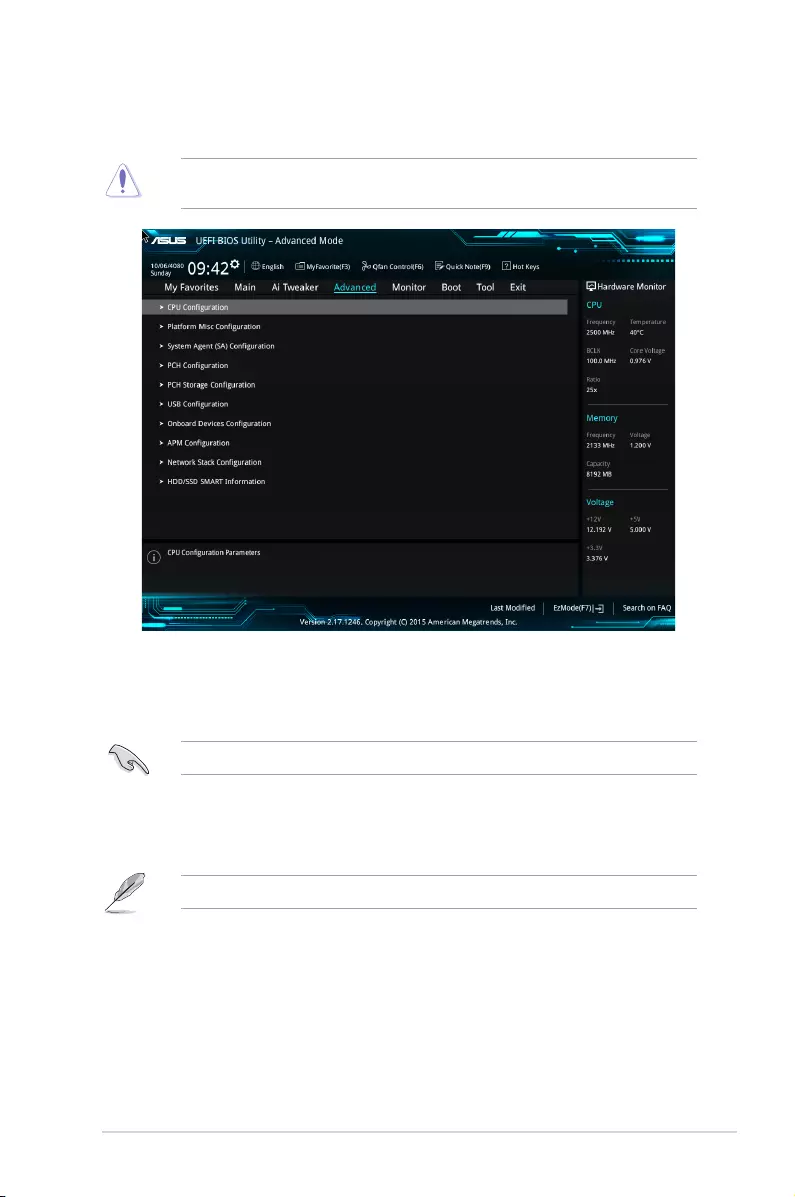
2.6 Advanced menu
The Advanced menu items allow you to change the settings for the CPU and other system
devices.
Be cautious when changing the settings of the Advanced menu items. Incorrect eld values
can cause the system to malfunction.
CPU Conguration
The items in this menu show the CPU‑related information that the BIOS automatically
detects.
The items shown in submenu may be different due to the CPU you installed.
Active Processor Cores [All]
This item allows you to select the number of CPU cores to activate in each processor
package. Conguration options: [All] [1] [2] [3]
For some CPU types, only [All] and [1] appear.
Intel Virtualization Technology [Disabled]
When set to [Enabled], a VMM can utilize the additional hardware capabilities provided by
Vanderpool Technology. Conguration options: [Disabled] [Enabled]
Hardware Prefetcher [Enabled]
This item allows the CPU to prefetch commands and data in the L2 cache, reduces the
DRAM loading time and improves the system performance. Conguration options: [Disabled]
[Enabled]
ASUS H110M-C 2-19

Adjacent Cache Line Prefetch [Enabled]
This item allows the mid level cache (L2) to prefetch adjacent cache lines, reducing the
DRAM loading time and improves the system performance. Conguration options: [Disabled]
[Enabled]
CPU Power Management Conguration
This item allows you to manage and congure the CPU’s power.
Intel® SpeedStepTM [Auto]
This item allows the operating system to dynamically adjust the processor voltage and
cores frequency, resulting to a decreased average power consumption and decreased
average heat production. Conguration options: [Disabled] [Enabled] [Auto]
Turbo Mode [Enabled]
This item allows you to automatically set the CPU cores to run faster than the base
operating frequency when it is below the operating power, current and temperature
specication limit. Conguration options: [Enabled] [Disabled]
Turbo Mode is only available on selected CPU models only.
CPU C states [Auto]
[Auto] Automatic conguration.
[Enabled] Enables the CPU C states.
[Disabled] Disables the CPU C states.
The following items appear only when you set the CPU C states to [Enabled].
Enhanced C states [Enabled]
[Enabled] Enables enhanced C1 state.
[Disabled] Disables enhanced C1 state.
CPU C3 Report [Enabled]
Allows you to disable or enable the CPU C3 report to OS. Conguration options:
[Enabled] [Disabled]
CPU C6 Report [Enabled]
Allows you to disable or enable the CPU C6 report to OS. Conguration options:
[Enabled] [Disabled]
CPU C7 Report [CPU C7s]
Allows you to disable or enable the CPU C7 report to OS. Conguration options:
[CPU C7] [CPU C7s] [Disabled]
CPU C8 Report [Enabled]
Allows you to disable or enable the CPU C8 report to OS. Conguration options:
[Enabled] [Disabled]
Package C State Limit [Auto]
Allows you to disable or enable the whole C‑State package support. Conguration
options: [C0/C1] [C2] [C3] [C6] [C7] [C7s] [C8] [Auto]
2-20 Chapter 2: Getting started

CFG Lock [Disabled]
This item allows you to congure the MSR 0xE2[15], CFG lock bit. Conguration
options: [Disabled] [Enabled]
Platform Misc Conguration
The items in this menu allow you to congure the platform‑related features.
PCI Express Native Power Management [Disabled]
This item allows you to enhance the power saving feature of PCI Express and perform ASPM
operations in the operating system. Conguration options: [Disabled] [Enabled]
The following item appears only when you set the PCI Express Native Power Management
to [Enabled].
Native ASPM [Disabled]
[Enabled] Windows® Vista OS controls the ASPM (active state power
management) support for devices.
[Disabled] BIOS controls the ASPM support for the device.
PCH - PCI Express options
DMI Link ASPM Control [Disabled]
This item allows you to control the Active State Power Management on both NB
(NorthBridge) side and SB (SouthBridge) side of the DMI Link. Conguration options:
[Disabled] [Enabled]
ASPM Support [Disabled]
This item allows you to select the ASPM state for energy‑saving conditions. Conguration
options: [Disabled] [L0s] [L1] [L0sL1] [Auto]
SA - PCI Express options
DMI Link ASPM Control [Disabled]
This item allows you to control the Active State Power Management on both CPU and PCH
(platform controller hub) Both DMI link ASPM control items of the CPU and PCH sides must
be enabled for the ASPM to take effect. Conguration options: [Disabled] [L1]
PEG-ASPM [Disabled]
This item allows you to select the ASPM state for energy‑saving conditions, or use the ASUS
optimized energy saving prole. Conguration options: [Disabled] [Auto] [ASPM L0s] [ASPM
L1] [ASPM L0sL1]
System Agent (SA) Conguration
VT-d [Disabled]
Allows you to enable or disable VT‑d function on MCH. Conguration options: [Enabled]
[Disabled]
ASUS H110M-C 2-21

Graphics Conguration
Allows you to select a primary display from CPU, PCIE and PCI graphical devices.
Primary Display [Auto]
Allows you to select the primary display from CPU, PCIE and PCI graphics devices.
Conguration options: [Auto] [CPU Graphics] [PCIE] [PCI]
iGPU Multi-Monitor [Disabled]
This item allows you to empower both integrated and discrete graphics devices for the
multi‑monitor output. The CPU graphics shared system memory size is xed at 64 MB.
Conguration options: [Disabled] [Enabled]
RC6(Render Standby) [Disabled]
Allows you to enable or disable render standby support. Conguration options:
[Disabled] [Enabled]
DVMT Pre-Allocated [32M]
Allows you to select DVMT 5.0 Pre_Allocated (Fixed) Graphics Memory size used by
the Internal Graphics Device. Conguration options: [32M] [64M] [96M] ~ [1024M]
DMI/OPI Conguration
This item allows you to control various DMI (direct media interface) to run at PCI‑E 2.0 speed.
DMI Max Link Speed [Auto]
Allows you to congure the DMI speed. Conguration options: [Auto] [Gen1] [Gen2]
PEG Port Conguration
Allows you to congure the PEG Port settings.
Enable Root Port [Enabled]
Allows you to enable or disable the root port. Conguration options: [Enabled]
[Disabled] [Auto]
PCIEx16_1 Link Speed [Auto]
Allows you to congure the PCIEx16 speed for slot 1. Conguration options: [Auto]
[Gen1] [Gen2] [Gen3]
Memory Conguration
Allows you to congure the memory conguration parameters.
Memory Remap [Enabled]
Set this item to [Enabled] to support DRAM address remapping for 64‑bit operating
systems. Conguration options: [Enabled] [Disabled]
PCH Conguration
This item allows you to congure the PCI Express conguration settings.
PCI Express Conguration
PCIe Speed [Auto]
Allows you to congure the PCIe speed. Conguration options: [Auto] [Gen1] [Gen2]
2-22 Chapter 2: Getting started

PCH Storage Conguration
While entering Setup, the BIOS automatically detects the presence of SATA devices. The
SATA Port items show Not Present if no SATA device is installed to the corresponding SATA
port.
SATA Controller(s) [Enabled]
Enables or disables onboard the SATA device. Conguration options: [Disabled] [Enabled]
The following items appear only when you set SATA Controller(s) to [Enabled].
Aggressive LPM Support [Disabled]
This item is designed for LPM (link power management) support with a better energy saving
conditions. When disabled, the hot plug function of SATA ports are disabled. Conguration
options: [Disabled] [Enabled]
Smart Self Test [On]
This item allows you to enable or disable the SMART Self Test on all HDDs during POST.
Conguration options: [On] [Off]
SATA6G_1~4(Gray) [Enabled]
Allow you to enable/disable the SATA6G_1~4 port. Conguration options: [Disabled]
[Enabled]
Hot Plug [Disabled]
These items allow you to enable/disable SATA Hot Plug Support. Conguration options:
[Disabled] [Enabled]
USB Conguration
The items in this menu allow you to change the USB‑related features.
The USB Devices item shows the auto‑detected values. If no USB device is detected, the
item shows None.
Legacy USB Support [Enabled]
[Enabled] Your system supports the USB devices in legacy operating systems.
[Disabled] Your USB devices can be used for BIOS setup only and cannot be
recognized in the boot devices list.
[Auto] Your system automatically detects the presence of USB devices at startup.
If any USB devices are detected, the legacy USB support is enabled.
XHCI Hand-off [Disabled]
[Enabled] Enables the support for operating systems without an XHCI hand‑off
feature.
[Disabled] Disables the XHCI Hand‑off support.
ASUS H110M-C 2‑23

USB Single Port Control
Allow you to enable or disable the USB Port Disable Override.
USB3_1~4 [Enabled]
Allows you to enable or disable the USB3.0 port 1~4 individually. Conguration
options: [Enabled] [Disabled]
USB 5~10 [Enabled]
Allows you to enable or disable the USB port 5~10 individually. Conguration options:
[Enabled] [Disabled]
Onboard Devices Conguration
HD Audio Controller [Enabled]
[Enabled] Enables the HD Audio Device.
[Disabled] Disables the HD Audio Device.
The following item appears only when you set the HD Audio Controller item to [Enabled].
Front Panel Type [HD Audio]
Allows you to set the front panel audio connector (AAFP) mode to legacy AC’97 or
high‑denition audio depending on the audio standard that the front panel audio
module supports.
[HD Audio] Sets the front panel audio connector (AAFP) mode to high denition
audio.
[AC97] Sets the front panel audio connector (AAFP) mode to legacy AC’97.
DVI Port Audio [Disabled]
Allows you to enable or disable audio output from the DVI port. Conguration options:
[Enabled] [Disabled]
Realtek LAN Controller [On]
[On] Enables the Realtek LAN controller.
[Off] Disables the controller.
Realtek PXE OPROM [Off]
This item appears only when you set the previous item to [On] and allows you to enable or
disable the PXE OPRom of the Realtek LAN controller. Conguration options: [On] [Off]
Charging USB devices in Power State S5 [Disabled]
[Enabled] Charges USB devices even when the system is in Power State S5.
[Disabled] Disables this function.
Serial Port Conguration
The sub‑items in this menu allow you to set the serial port conguration.
Serial Port [On]
Allows you to enable or disable the serial port (COM).Conguration options: [On] [Off]
2-24 Chapter 2: Getting started

Change Settings [IO=3F8h; IRQ=4]
This item appears only when you set the Serial Port to [Enabled] and allows you
to select the Serial Port base address. Conguration options: [IO=3F8h; IRQ=4]
[IO=2F8h; IRQ=3] [IO=3E8h; IRQ=4] [IO=2E8h; IRQ=3]
Serial Port 1 Conguration
The sub‑items in this menu allow you to set the serial port 1 conguration.
Serial Port [On]
Allows you to enable or disable the serial port (COM) 1.Conguration options: [On] [Off]
Change Settings [IO=2F8h; IRQ=3]
This item appears only when you set the Serial Port to [Enabled] and allows you
to select the Serial Port base address. Conguration options: [IO=3F8h; IRQ=4]
[IO=2F8h; IRQ=3] [IO=3E8h; IRQ=4] [IO=2E8h; IRQ=3]
Parallel Port Conguration
The sub‑items in this menu allow you to set the parallel port conguration.
Parallel Port [On]
Allows you to enable or disable the parallel port (LPT/LPTE). Conguration options:
[On] [Off]
The following items appear only when you set the Parallel Port Conguration item to
[On].
Change Settings [Auto]
Allows you to select an optimal setting for Super I/O devices. Conguration
options: [Auto] [IO=378h; IRQ=5;] [IO=378h; IRQ=5,6,7,9,10,11,12;] [IO=278h;
IRQ=5,6,7,9,10,11,12;] [IO=3BCh; IRQ=5,6,7,9,10,11,12;]
Device Mode [STD Printer Mode]
Allows you to select the Printer Port mode. Conguration options: [STD Printer Mode]
[SPP Mode] [EPP‑1.9 and SPP Mode] [EPP‑1.7 and SPP Mode] [ECP Mode] [ECP
and EPP 1.9 Mode] [ECP and EPP 1.7 Mode]
APM Conguration
ErP Ready [Disabled]
Allows BIOS to switch off some power at S4/S5 to get the system ready for ErP requirement.
When set to [Enabled], all other PME options will be switched off. Conguration options:
[Enable(S4+S5)] [Enable(S5)] [Disabled]
Restore AC Power Loss [Power Off]
[Power On] The system goes into on state after an AC power loss.
[Power Off] The system goes into off state after an AC power loss.
[Last State] The system goes into either off or on state, whatever the system state was
before the AC power loss.
ASUS H110M-C 2‑25

Power On By PS/2 Keyboard [Disabled]
[Disabled] Disables the Power On by a PS/2 keyboard.
[Space Bar] Sets the Space Bar on the PS/2 keyboard to turn on the system.
[Ctrl‑Esc] Sets the Ctrl+Esc key on the PS/2 keyboard to turn on the system.
[Power Key] Sets Power key on the PS/2 keyboard to turn on the system. This feature
requires an ATX power supply that provides at least 1A on the +5VSB lead.
Power On By PCI-E/PCI [Disabled]
This item allows you to enable or disable the Wake‑on‑LAN function of the onboard LAN
controller or other installed PCIe/PCI LAN cards. Conguration options: [Disabled] [Enabled]
Power On By Ring [Disabled]
[Disabled] Disables Ring to generate a wake event.
[Enabled] Enables Ring to generate a wake event.
Power On By RTC [Disabled]
This item allows you to enable or disable the RTC (Real‑Time Clock) to generate a wake
event and congure the RTC alarm date. When enabled, you can set the days, hours,
minutes, or seconds to schedule an RTC alarm date. Conguration options: [Disabled]
[Enabled]
Network Stack Conguration
Network Stack [Disabled]
This item allows user to disable or enable the UEFI network stack. Conguration options:
[Disabled] [Enabled]
The following two items appear only when you set the previous item to [Enabled].
Ipv4 / Ipv6 PXE Support [Enabled]
This item allows you to enable or disable the Ipv4/Ipv6 PXE wake event. Conguration
options: [Disabled] [Enabled]
HDD/SSD SMART Information
This menu displays the SMART information of the connected devices.
2‑26 Chapter 2: Getting started
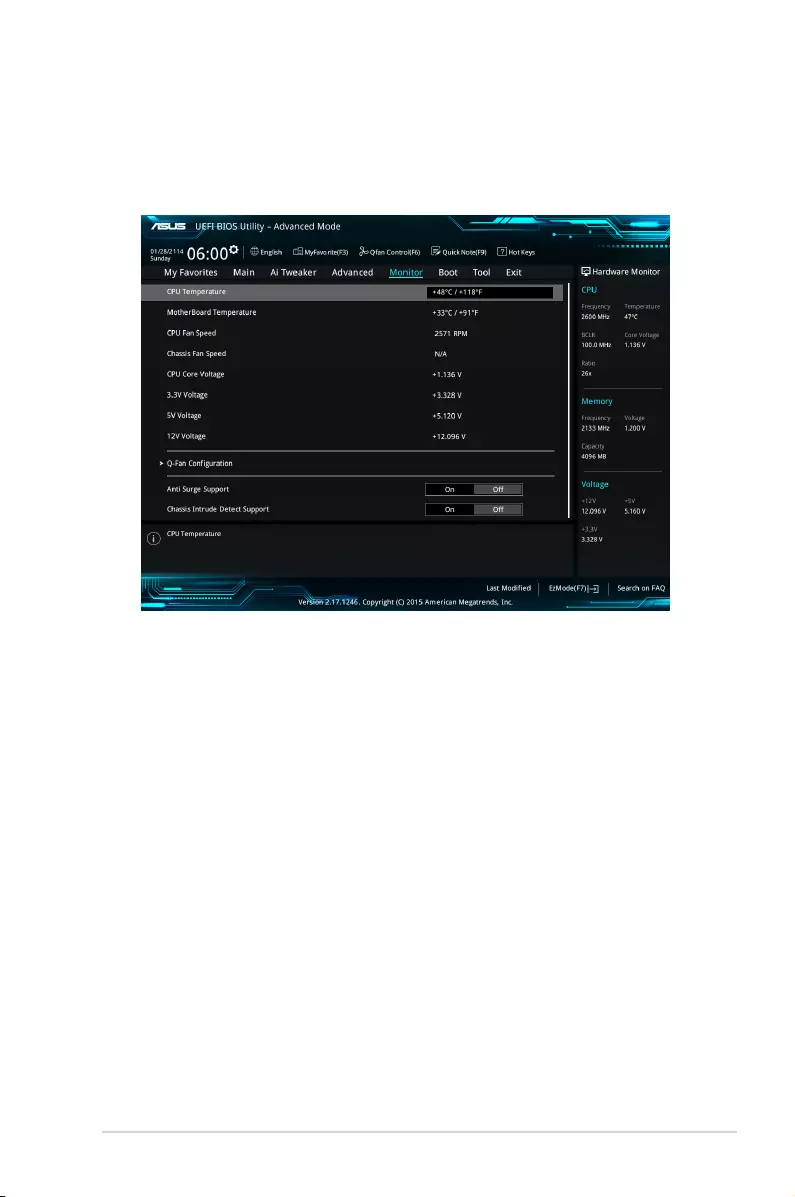
2.7 Monitor menu
The Monitor menu displays the system temperature/power status, and allows you to change
the fan settings.
Scroll down to display the other BIOS items.
CPU / MotherBoard Temperature [xxxºC/xxxºF]/ [Ignore]
The onboard hardware monitor automatically detects and displays the CPU and motherboard
temperatures. Select [Ignore] if you do not wish to display the detected temperatures.
CPU Fan/ Chassis Fan Speed [xxxx RPM]/ [Ignore]/ [N/A]
The onboard hardware monitor automatically detects and displays the CPU and chassis fan
speed in rotations per minute (RPM). If the fan is not connected to the motherboard, the eld
shows N/A. Select [Ignore] if you do not wish to display the detected speed.
CPU Core Voltage, 3.3V Voltage, 5V Voltage, 12V Voltage,
The onboard hardware monitor automatically detects the voltage output through the onboard
voltage regulators. Select [Ignore] if you do not want to detect this item.
Q-Fan Conguration
Q-Fan Tuning
Click [OK] button to detect the lowest speed and congure the minimum duty circle for each
fan. Do not shut down or reset your system during the tuning progress. Conguration options:
[Ok] [Cancel]
ASUS H110M-C 2‑27

CPU Q-Fan Control [PWM Mode]
[Disabled] Disables the CPU Q‑Fan control feature.
[PWM Mode] Enable the CPU Q‑Fan control in PWM mode for 4‑pin CPU fan.
CPU Fan Speed Lower Limit [200 RPM]
This item appears only when you enable the CPU Q‑Fan Control feature and allows you
to disable or set the CPU fan warning speed. Conguration options: [Ignore] [100RPM]
[200RPM] [300 RPM] [400 RPM] [500 RPM]
CPU Fan Prole [Standard]
This item appears only when you enable the CPU Q‑Fan Control feature and allows you to
set the appropriate performance level of the CPU fan.
[Standard] Sets to [Standard] to make the CPU fan automatically adjust depending on
the CPU temperature.
[Silent] Sets to [Silent] to minimize the fan speed for quiet CPU fan operation.
[Turbo] Sets to [Turbo] to achieve maximum CPU fan speed.
[Manual] Sets to [Manual] to assign detailed fan speed control parameters.
The following four items appear only when you set CPU Fan Prole to [Manual].
CPU Upper Temperature [70]
Use the <+> and <‑> keys to adjust the upper limit of the CPU temperature. The values
range from 25ºC to 75ºC.
CPU Fan Max. Duty Cycle(%) [100]
Use the <+> and <‑> keys to adjust the maximum CPU fan duty cycle. The values
range from 20% to 100%. When the CPU temperature reaches the upper limit, the
CPU fan will operate at the maximum duty cycle.
CPU Middle Temperature [25]
Use the <+> or <‑> keys to set the value for CPU Middle Temperature. The range of
the values depends on the CPU installed.
CPU Fan Middle Duty Cycle(%) [20]
Use the <+> or <‑> keys to adjust the CPU fan middle duty cycle. The values range
from 20% to 100%. When the CPU temperature reaches the upper limit, the CPU fan
operates at the maximum duty cycle.
CPU Lower Temperature [20]
Use the <+> or <‑> keys to adjust the CPU fan’s lower temperature. The values range
from 20°C to 75°C.
CPU Fan Min. Duty Cycle(%) [20]
Use the <+> and <‑> keys to adjust the minimum CPU fan duty cycle. The values
range from 20% to 100%. When the CPU temperature is under the lower limit, the CPU
fan will operate at the minimum duty cycle.
2‑28 Chapter 2: Getting started

Chassis Fan Q-Fan Control [DC Mode]
[PWM mode] Enables the chassis Q‑Fan control in PWM mode for 4‑pin chassis fan.
[DC mode] Enables the chassis Q‑Fan control in DC mode for 3‑pin chassis fan.
[Disabled] Disables the chassis Q‑Fan control feature.
The following items appear only when you set the Chassis Fan Q‑Fan Control to [PWM
Mode] or [DC Mode].
Chassis Fan Q-Fan Source [CPU]
This item controls the assigned fan according to the selected temperature source.
Conguration options: [CPU] [MB]
Chassis Fan Speed Low Limit [600 RPM]
This item allows you to disable or set the chassis fan warning speed. Conguration options:
[Ignore] [200RPM] [300 RPM] [400 RPM] [500 RPM] [600 RPM]
Chassis Fan Prole [Standard]
This item allows you to set the appropriate performance level of the chassis fan.
[Standard] Sets to [Standard] to make the chassis fan automatically adjust depending
on the chassis temperature.
[Silent] Sets to [Silent] to minimize the fan speed for quiet chassis fan operation.
[Turbo] Sets to [Turbo] to achieve maximum chassis fan speed.
[Manual] Sets to [Manual] to assign detailed fan speed control parameters.
The following four items appear only when you set Chassis Fan Prole to [Manual].
Chassis Fan Upper Temperature [70]
Use the <+> or <‑> keys to adjust the upper limit of the chassis temperature. The
values range from 40°C to 75°C.
Chassis Fan Max. Duty Cycle(%) [100]
Use the <+> or <‑> keys to adjust the maximum chassis fan duty cycle. The values
range from 60% to 100%. When the chassis temperature reaches the upper limit, the
chassis fan will operate at the maximum duty cycle.
Chassis Fan Middle Temperature [45]
Use the <+> or <‑> keys to set the value for Chassis Fan Middle Temperature.
Chassis Fan Middle Duty Cycle(%) [60]
Use the <+> or <‑> keys to adjust the chassis fan middle duty cycle. The values range
from 60% to 100%.
Chassis Fan Lower Temperature [40]
Use the <+> or <‑> keys to adjust the chassis fans’ lower temperature. The values
range from 20°C to 75°C.
Chassis Fan Min. Duty Cycle(%) [60]
Use the <+> or <‑> keys to adjust the minimum chassis fan duty cycle. The values
range from 60% to 100%. When the CPU temperature is under the lower limit, the
chassis fan operates at the minimum duty cycle.
ASUS H110M-C 2-29
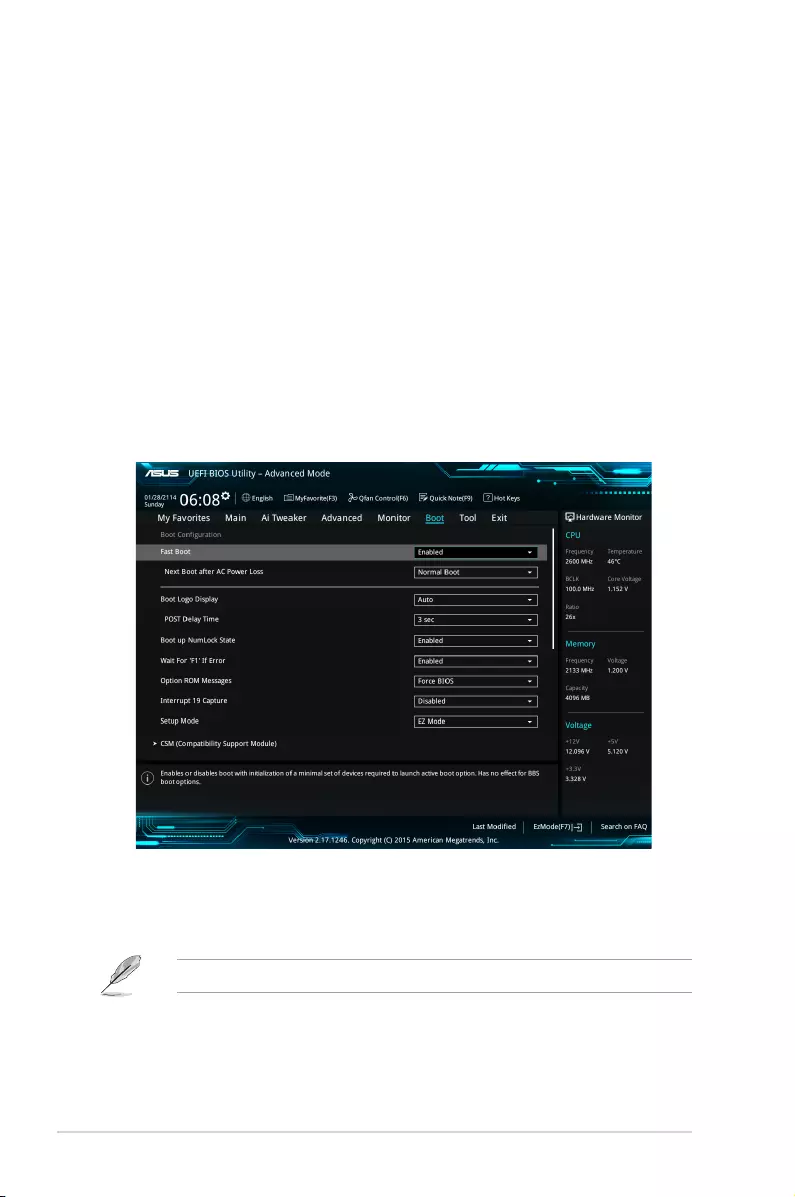
Anti Surge Support [Off]
This item allows you to enable or disable the Anti Surge function.
Conguration options: [On] [Off]
Chassis Intrude Detect Support [Off]
This item allows you to enable or disable the chassis intrusion detection function. Connect
one end of the chassis intrusion sensor or switch cable to the chassis instrusion connector.
The chassis intrusion sensor or switch cable sends high‑level signal to the connector when
a chassis component is removed or replaced. The signal is then generated as a chassis
intrusion event. Conguration options: [On] [Off]
2.8 Boot menu
The Boot menu items allow you to change the system boot options.
Scroll down to display the other BIOS items.
Fast Boot [Enabled]
[Enabled] Select to accelerate the boot speed.
[Disabled] Select to go back to normal boot speed.
The following item appears only when you set Fast Boot to [Enabled].
Next Boot after AC Power Loss [Normal Boot]
[Normal Boot] Returns to normal boot on the next boot after AC power loss.
[Fast Boot] Accelerates the boot speed on the next boot after AC power loss.
2‑30 Chapter 2: Getting started

Boot Logo Display [Auto]
[Auto] Adjusts logo automatically based on Windows® display requirements.
[Full Screen] Maximize the boot logo size.
[Disabled] Hide the logo during POST.
POST Delay Time [3 sec]
This item appears only when you set Boot Logo Display to [Auto] and [Full Screen]. This item
allows you to select the desired additional POST waiting time to easily enter the BIOS setup.
You can only execute the POST delay time during Normal Boot. The values range from 0 to
10 seconds.
This feature will only work under normal boot.
Post Report [5 sec]
This item appears only when you set Boot Logo Display to [Disabled]. This item allows you to
select a desired post report waiting time. Conguration options: [1 sec] ~ [10 sec] [Until Press
ESC].
Boot up NumLock State [Enabled]
This item allows you to enable or disable power‑on state of the NumLock. Conguration
options: [Disabled] [Enabled]
Wait for ‘F1’ If Error [Enabled]
When this item is set to [Enabled], the system waits for the F1 key to be pressed when error
occurs. Conguration options: [Disabled] [Enabled]
Option ROM Messages [Force BIOS]
[Force BIOS] The third‑party ROM messages will be forced to display during the boot
sequence.
[Keep Current] The third‑party ROM messages will be displayed only if the third‑party
manufacturer had set the add‑on device to do so.
Interrupt 19 Capture [Disabled]
This item allows you to trap Interrupt 19 by the option ROMs. Conguration options:
[Disabled] [Enabled]
Setup Mode [EZ Mode]
[Advanced Mode] This item allows you to go to Advanced Mode of the BIOS after POST.
[EZ Mode] This item allows you to go to EZ Mode of the BIOS after POST.
CSM (Compatibility Support Module)
Allows you to congure the CSM (Compatibility Support Module) items to fully support the
various VGA, bootable devices and add‑on devices for better compatibility.
ASUS H110M-C 2‑31

Launch CSM [Enabled]
[Auto] The system automatically detects the bootable devices and the add‑on
devices.
[Enabled] For better compatibility, enable the CSM to fully support the non‑UEFI
driver add‑on devices or the Windows® UEFI mode.
[Disabled] Disable the CSM to fully support the Windows® Security Update and
Security Boot.
The following four items appear when you set Launch CSM to [Enabled].
Boot Device Control [UEFI and Legacy OPROM]
Allows you to select the type of devices that you want to boot up. Conguration options:
[UEFI and Legacy OPROM] [Legacy OPROM only] [UEFI only]
Boot from Network Devices [Legacy only]
Allows you to select the type of network devices that you want to launch. Conguration
options: [Ignore] [Legacy only] [UEFI driver rst]
Boot from Storage Devices [Legacy Only]
Allows you to select the type of storage devices that you want to launch. Conguration
options: [Ignore] [Legacy only] [UEFI driver rst]
Boot from PCI-E/PCI Expansion Devices [Legacy Only]
Allows you to select the type of PCI‑E/PCI expansion devices that you want to launch.
Conguration options: [Legacy only] [UEFI driver rst]
Secure Boot
Allows you to congure the Windows® Secure Boot settings and manage its keys to protect
the system from unauthorized access and malwares during POST.
OS Type [Windows UEFI mode]
Allows you to select your installed operating system.
[Windows UEFI mode] This item allows you to select your installed operating system.
Execute the Microsoft® Secure Boot check. Only select this
option when booting on Windows® UEFI mode or other Microsoft®
Secure Boot compliant OS.
[Other OS] Get the optimized function when booting on Windows® non‑UEFI
mode. Microsoft® Secure Boot only supports Windows® UEFI
mode.
Key Management
This allows you to manage the Secure Boot keys.
Install Default Secure Boot keys
This item allows you to immediately load the default Security Boot keys, Platform key
(PK), Key‑exchange Key (KEK), Signature database (db), and Revoked Signatures
(dbx). When the default Secure boot keys are loaded, all the Secure Boot keys’ state
will change from Unloaded mode to loaded mode.
2‑32 Chapter 2: Getting started

Clear Secure Boot keys
This item appears only when you load the default Secure Boot keys. This item allows
you to clear all the previously applied Secure Boot keys.
Save Secure Boot Keys
This item allows you to save all the Secure Boot keys to a USB storage device.
PK Management
The Platform Key (PK) locks and secures the rmware from any non‑permissible
changes. The system veries the PK before your system enters the OS.
Set New Key
Allows you to set a new key from your system. Press [Yes] to load factory default
PK or select [No] to load it from a le on external media Conguration options: [Yes]
[No]
Delete PK
Allows you to delete the PK from your system. Once the PK is deleted, all the
system’s Secure Boot keys will not be active. Conguration options: [Yes] [No]
The PK le must be formatted as a public key certicate or UEFI variable structure with
time‑based authenticated variable.
KEK Management
The KEK (Key‑exchange Key or Key Enrollment Key) manages the Signature database
(db) and Revoked Signature database (dbx).
Key‑exchange Key (KEK) refers to Microsoft® Secure Boot Key‑Enrollment Key (KEK).
Set New Key
Allows you to set a new key.
Append Key
Allows you to load the additional KEK from a storage device for an additional db and
dbx loaded management.
The KEK le must be formatted as a public key certicate or UEFI variable structure with
time‑based authenticated variable.
Delete key
Allows you to delete the Key from your system. Conguration options: [Yes] [No]
DB Management
The db (Authorized Signature database) lists the signers or images of UEFI
applications, operating system loaders, and UEFI drivers that you can load on the
single computer.
Set New Key
Allows you to set a new key.
Append Key
Allows you to load the additional KEK from a storage device for an additional db and
dbx loaded management.
The KEK le must be formatted as a public key certicate or UEFI variable structure with
time‑based authenticated variable.
ASUS H110M-C 2‑33

Delete key
Allows you to delete the Key from your system. Conguration options: [Yes] [No]
DBX Management
The DBX (Revoked Signature database) lists the forbidden images of db items that are
no longer trusted and cannot be loaded.
Set New Key
Allows you to set a new key.
Append Key
Allows you to load the additional KEK from a storage device for an additional db and
dbx loaded management.
The KEK le must be formatted as a public key certicate or UEFI variable structure with
time‑based authenticated variable.
Delete key
Allows you to delete the Key from your system. Conguration options: [Yes] [No]
Boot Option Priorities
These items specify the boot device priority sequence from the available devices. The
number of device items that appears on the screen depends on the number of devices
installed in the system.
• To access Windows® OS in Safe Mode, press <F8 > after POST (Windows® 8 not
supported).
• To select the boot device during system startup, press <F8> when ASUS Logo
appears.
Boot Override
These items displays the available devices. The number of device items that appears on
the screen depends on the number of devices installed in the system. Click an item to start
booting from the selected device.
2‑34 Chapter 2: Getting started

2.9 Tool menu
The Tool menu items allow you to congure options for special functions. Select an item then
press <Enter> to display the submenu.
ASUS EZ Flash 3 Utility
Allows you to run ASUS EZ Flash 3. Press [Enter] to launch the ASUS EZ Flash 3 screen.
For more details, see section 2.1.2 ASUS EZ Flash 3.
Secure Erase
SSD speeds may lower over time as with any storage medium due to data processing.
Secure Erase completely and safely cleans your SSD, restoring it to factory performance
levels.
Check the ASUS support site for a full list of SSDs tested with Secure Erase. The drive may
become unstable if you run Secure Erase on an incompatible SSD.
• The time to erase the contents of your SSD may take a while depending on its size.
Do not turn off the system during the process.
• Secure Erase is only supported on Intel SATA port. For more information about Intel
SATA ports, refer to section 1.2.3 Motherboard layout of this manual.
ASUS H110M-C 2‑35

Setup Animator [Disabled]
Enables or disables the Setup animator. Conguration options: [Disabled] [Enabled]
ASUS Overclocking Prole
This item allows you to store or load multiple BIOS settings.
The Overclocking Prole items show Not assigned if no prole is created.
Load from Prole
Allows you to load the previous BIOS settings saved in the BIOS Flash. Key in the prole
number that saved your CMOS settings, press <Enter>, and then select Yes.
• DO NOT shut down or reset the system while updating the BIOS to prevent the
system boot failure!
• We recommend that you update the BIOS le only coming from the same memory/
CPU conguration and BIOS version.
Prole Name
Allows you to create a name for the prole you want to save.
Save to Prole
Allows you to save the current BIOS settings to the BIOS Flash, and create a prole. Key in a
prole number from one to eight, press <Enter>, and then select Yes.
Displays the
available SSDs
Status denition:
• Frozen. The frozen state is the result of a BIOS protective measure. The BIOS
guards drives that do not have password protection by freezing them prior to booting.
If the drive is frozen, a power off or hard reset of your PC must be performed to
proceed with the Secure Erase.
• Locked. SSDs might be locked if the Secure Erase process is either incomplete
or was stopped. This may be due to a third party software that uses a different
password dened by ASUS. You have to unlock the SSD in the software before
proceeding with Secure Erase.
2‑36 Chapter 2: Getting started

Load Optimized Defaults
This option allows you to load the default values for each of the parameters on the Setup
menus. When you select this option or if you press <F5>, a conrmation window appears.
Select OK to load the default values.
Save Changes & Reset
Once you are nished making your selections, choose this option from the Exit menu to
ensure the values you selected are saved. When you select this option or if you press <F10>,
a conrmation window appears. Select OK to save changes and exit.
Discard Changes and Exit
This option allows you to exit the Setup program without saving your changes. When you
select this option or if you press <Esc>, a conrmation window appears. Select OK to discard
changes and exit.
Launch EFI Shell from USB drives
This option allows you to attempt to launch the EFI Shell application (shellx64.e) from one of
the available USB devices.
Load/Save Prole from/to USB Drive
This item allows you to load or save prole from your USB drive, load and save prole to your
USB drive.
ASUS SPD Information
DIMM Slot number [DIMM_A1]
Displays the Serial Presence Detect (SPD) information of the DIMM module installed on the
selected slot. Conguration options: [DIMM_A1] [DIMM_B1]
2.10 Exit menu
The Exit menu items allow you to load the optimal default values for the BIOS items, and
save or discard your changes to the BIOS items.
ASUS H110M-C 2‑37

2‑38 Chapter 2: Getting started

Appendices
Notices
Federal Communications Commission Statement
This device complies with Part 15 of the FCC Rules. Operation is subject to the following two
conditions:
• This device may not cause harmful interference.
• This device must accept any interference received including interference that may cause
undesired operation.
This equipment has been tested and found to comply with the limits for a Class B digital
device, pursuant to Part 15 of the FCC Rules. These limits are designed to provide
reasonable protection against harmful interference in a residential installation. This
equipment generates, uses and can radiate radio frequency energy and, if not installed
and used in accordance with manufacturer’s instructions, may cause harmful interference
to radio communications. However, there is no guarantee that interference will not occur
in a particular installation. If this equipment does cause harmful interference to radio or
television reception, which can be determined by turning the equipment off and on, the user
is encouraged to try to correct the interference by one or more of the following measures:
• Reorient or relocate the receiving antenna.
• Increase the separation between the equipment and receiver.
• Connect the equipment to an outlet on a circuit different from that to which the receiver
is connected.
• Consult the dealer or an experienced radio/TV technician for help.
The use of shielded cables for connection of the monitor to the graphics card is required
toassurecompliancewithFCCregulations.Changesormodicationstothisunitnot
expressly approved by the party responsible for compliance could void the user’s authority
to operate this equipment.
IC: Canadian Compliance Statement
ComplieswiththeCanadianICES-003ClassBspecications.ThisdevicecomplieswithRSS
210 of Industry Canada. This Class B device meets all the requirements of the Canadian
interference-causing equipment regulations.
This device complies with Industry Canada license exempt RSS standard(s). Operation is
subject to the following two conditions: (1) this device may not cause interference, and (2)
this device must accept any interference, including interference that may cause undesired
operation of the device.
Cut appareil numérique de la Classe B est conforme à la norme NMB-003 du Canada.
Cet appareil numérique de la Classe B respecte toutes les exigences du Règlement sur le
matériel brouilleur du Canada.
Cet appareil est conforme aux normes CNR exemptes de licence d’Industrie Canada. Le
fonctionnement est soumis aux deux conditions suivantes :
(1) cet appareil ne doit pas provoquer d’interférences et
(2) cet appareil doit accepter toute interférence, y compris celles susceptibles de provoquer
un fonctionnement non souhaité de l’appareil.
ASUS H110M-C A-1

REACH
Complying with the REACH (Registration, Evaluation, Authorisation, and Restriction of
Chemicals) regulatory framework, we published the chemical substances in our products at
ASUS REACH website at http://csr.asus.com/english/REACH.htm.
DO NOT throw the motherboard in municipal waste. This product has been designed to
enable proper reuse of parts and recycling. This symbol of the crossed out wheeled bin
indicates that the product (electrical and electronic equipment) should not be placed in
municipal waste. Check local regulations for disposal of electronic products.
DO NOT throw the mercury-containing button cell battery in municipal waste. This symbol
of the crossed out wheeled bin indicates that the battery should not be placed in municipal
waste.
ASUS Recycling/Takeback Services
ASUS recycling and takeback programs come from our commitment to the highest standards
for protecting our environment. We believe in providing solutions for you to be able to
responsibly recycle our products, batteries, other components as well as the packaging
materials. Please go to http://csr.asus.com/english/Takeback.htm for detailed recycling
information in different regions.
Canadian Department of Communications Statement
This digital apparatus does not exceed the Class B limits for radio noise emissions from
digital apparatus set out in the Radio Interference Regulations of the Canadian Department
of Communications.
This class B digital apparatus complies with Canadian ICES-003.
VCCI: Japan Compliance Statement
VCCI Class B Statement
This is a Class B product based on the standard of the VCCI Council. If this is used near a
radio or television receiver in a domestic environment, it may cause radio interference. Install
and use the equipment according to the instruction manual.
KC: Korea Warning Statement
A-2 Appendices

Google™ License Terms
Copyright© 2014 Google Inc. All Rights Reserved.
LicensedundertheApacheLicense,Version2.0(the“License”);youmaynotusethisle
except in compliance with the License. You may obtain a copy of the License at:
http://www.apache.org/licenses/LICENSE-2.0
Unless required by applicable law or agreed to in writing, software distributed under the
License is distributed on an “AS IS” BASIS, WITHOUT WARRANTIES OR CONDITIONS OF
ANY KIND, either express or implied.
SeetheLicenseforthespeciclanguagegoverningpermissionsandlimitationsunderthe
License.
Latviski Līdz ar šo AsusTek Inc. paziņo, ka šī ierīce atbilst būtiskajām
prasībām un citiem saistošajiem nosacījumiem, kas norādīti CE direktīvā. Lai
uzzinātu vairāk, skatiet CE Atbilstības deklarāciju.
Lietuvių Šiuo dokumentu bendrovė „AsusTek Inc.“ pareiškia, kad šis
įrenginys atitinka pagrindinius CE direktyvų reikalavimus ir kitas susijusias
nuostatas. Daugiau informacijos rasite CE atitikties deklaracijoje.
Norsk AsusTek Inc. erklærer herved at denne enheten er i samsvar med
hovedsaklige krav og andre relevante forskrifter i CE-direktiver. Du nner
mer informasjon i CE-samsvarserklæringen.
Polski Niniejszym AsusTek Inc. deklaruje, że to urządzenie jest zgodne z
istotnymi wymaganiami oraz innymi powiązanymi zaleceniami Dyrektyw
CE. W celu uzyskania szczegółów, sprawdź Deklarację zgodności CE.
Português A AsusTek Inc. declara que este dispositivo está em
conformidade com os requisitos essenciais e outras disposições relevantes
das Diretivas da CE. Para mais detalhes, consulte a Declaração de
Conformidade CE.
Română Prin prezenta, AsusTek Inc. declară faptul că acest dispozitiv
respectă cerinţele esenţiale şi alte prevederi relevante ale directivelor CE.
Pentru mai multe detalii, consultaţi declaraţia de conformitate CE.
Srpski AsusTek Inc. ovim izjavljuje da je ovaj uređaj u saglasnosti sa
ključnim zahtevima i drugim relevantnim odredbama CE Direktiva. Molimo
vas, pogledajte CE Deklaraciju o usklađenosti za više detalja.
Slovensky Spoločnosť AsusTek Inc. týmto prehlasuje, že toto zariadenie
vyhovuje príslušným požiadavkám a ďalším súvisiacim ustanoveniam
smerníc ES. Viac podrobností si pozrite v prehlásení o zhode ES.
Slovenščina AsusTek Inc. tukaj izjavlja, da je ta naprava skladna s
temeljnimi zahtevami in drugimi relevantnimi določili direktiv CE. Za več
informacij glejte Izjavo CE o skladnosti.
Español Por la presente, AsusTek Inc. declara que este dispositivo cumple
los requisitos básicos y otras disposiciones relevantes de las directivas
de la CE. Consulte la Declaración de conformidad de la CE para obtener
más detalles.
Svenska AsusTek Inc. förklarar härmed att denna enhet är i
överensstämmelse med de grundläggande kraven och andra relevanta
bestämmelser i CE-direktiven. Se CE-försäkran om överensstämmelse för
mer information.
Українська AsusTek Inc. заявляє, що цей пристрій відповідає основним
вимогам відповідних Директив ЄС. Будь ласка, див. більше подробиць у
Декларації відповідності нормам ЄС.
Türkçe AsusTek Inc., bu aygıtın temel gereksinimlerle ve CE Yönergelerinin
diğer ilgili koşullarıyla uyumlu olduğunu beyan eder. Daha fazla ayrıntı için
lütfen CE Uygunluk Beyanına bakın.
Bosanski AsusTek Inc. ovim potvrđuje da je ovaj uređaj usklađen s
osnovnim zahtjevima i drugim relevantnim propisima Direktiva EK. Za više
informacija molimo pogledajte Deklaraciju o usklađenosti EK.
English AsusTek Inc. hereby declares that this device is in compliance with
the essential requirements and other relevant provisions of CE Directives.
Please see the CE Declaration of Conformity for more details.
Français AsusTek Inc. déclare par la présente que cet appareil est
conforme aux critères essentiels et autres clauses pertinentes des directives
européennes. Veuillez consulter la déclaration de conformité CE pour plus
d’informations.
Deutsch AsusTek Inc. erklärt hiermit, dass dieses Gerät mit den
wesentlichen Anforderungen und anderen relevanten Bestimmungen der
CE-Richtlinien übereinstimmt. Weitere Einzelheiten entnehmen Sie bitte der
CE-Konformitätserklärung.
Italiano AsusTek Inc. con la presente dichiara che questo dispositivo
è conforme ai requisiti essenziali e alle altre disposizioni pertinenti alle
direttive CE. Per maggiori informazioni fate riferimento alla dichiarazione
di conformità CE.
Компания ASUS заявляет, что это устройство соответствует основным
требованиям и другим соответствующим условиям европейских
директив. Подробную информацию, пожалуйста, смотрите в декларации
соответствия.
Български С настоящото AsusTek Inc. декларира, че това устройство
е в съответствие със съществените изисквания и другите приложими
постановления на директивите CE. Вижте CE декларацията за
съвместимост за повече информация.
Hrvatski AsusTek Inc. ovim izjavljuje da je ovaj uređaj sukladan s bitnim
zahtjevima i ostalim odgovarajućim odredbama CE direktiva. Više
pojedinosti potražite u CE izjavi o sukladnosti.
Čeština Společnost AsusTek Inc. tímto prohlašuje, že toto zařízení
splňuje základní požadavky a další příslušná ustanovení směrnic CE. Další
podrobnosti viz Prohlášení o shodě CE.
Dansk AsusTek Inc. Erklærer hermed, at denne enhed er i
overensstemmelse med hovedkravene and andre relevante bestemmelser i
CE-direktiverne. Du kan læse mere i CE-overensstemmelseserklæring.
Nederlands AsusTek Inc. verklaart hierbij dat dit apparaat compatibel
is met de essentiële vereisten en andere relevante bepalingen van CE-
richtlijnen. Raadpleeg de CE-verklaring van conformiteit voor meer details.
Eesti Käesolevaga kinnitab AsusTek Inc., et see seade vastab CE direktiivide
oluliste nõuetele ja teistele asjakohastele sätetele. Vt üksikasju CE
vastavusdeklaratsioonist.
Suomi AsusTek Inc. vakuuttaa täten, että tämä laite on CE-direktiivien
olennaisten vaatimusten ja muiden asiaan kuuluvien lisäysten mukainen.
Katso lisätietoja CE-vaatimustenmukaisuusvakuutuksesta.
Ελληνικά Με το παρόν, η AsusTek Inc. Δηλώνει ότι αυτή η συσκευή
συμμορφώνεται με τις θεμελιώδεις απαιτήσεις και άλλες σχετικές διατάξεις
των Οδηγιών της ΕΕ. Για περισσότερες λεπτομέρειες ανατρέξτε στην
Δήλωση Συμμόρφωσης ΕΕ.
Magyar Az AsusTek Inc. ezennel kijelenti, hogy a készülék megfelel
a CE-irányelvek alapvető követelményeinek és ide vonatkozó egyéb
rendelkezéseinek. További részletekért tekintse meg a CE-megfelelőségi
nyilatkozatot.
ASUS H110M-C A-3

ASUS contact information
ASUSTeK COMPUTER INC.
Address 15 Li-Te Road, Peitou, Taipei, Taiwan 11259
Telephone +886-2-2894-3447
Fax +886-2-2890-7798
E-mail info@asus.com.tw
Web site http://www.asus.com
Technical Support
Telephone +86-21-3842-9911
Fax +86-21-5866-8722 ext. 9101#
Online support http://support.asus.com/techserv/techserv.aspx
ASUS COMPUTER INTERNATIONAL (America)
Address 800 Corporate Way, Fremont, CA 94539, USA
Telephone +1-510-739-3777
Fax +1-510-608-4555
Web site http://www.asus.com/us/
Technical Support
Support fax +1-812-284-0883
General support +1-812-282-2787
Online support http://www.service.asus.com/
ASUS COMPUTER GmbH (Germany and Austria)
Address Harkort Str. 21-23, D-40880 Ratingen, Germany
Fax +49-2102-959931
Web site http://www.asus.com/de
Online contact http://eu-rma.asus.com/sales
Technical Support
Telephone +49-2102-5789555
Support Fax +49-2102-959911
Online support http://www.asus.com/de/support/
A-4 Appendices
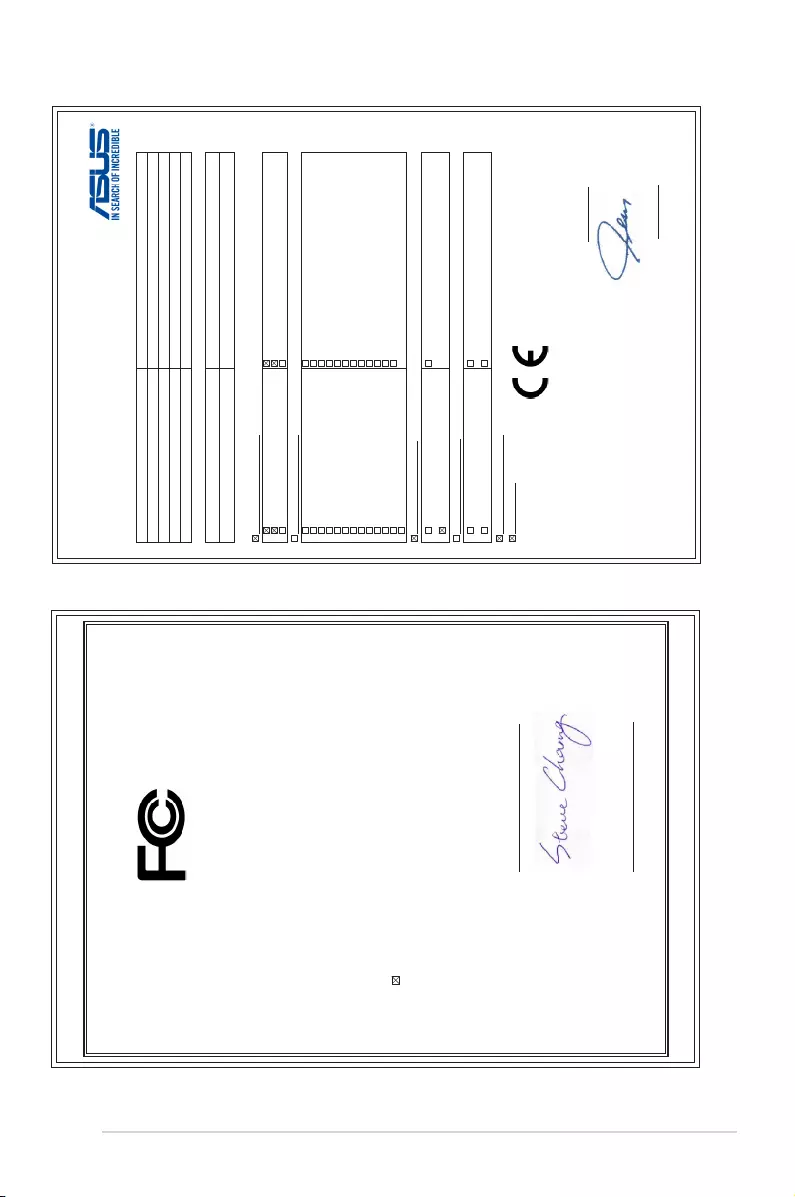
EC Declaration of Conformity
We, the undersigned,
Manufacturer:
ASUSTeK COMPUTER INC.
Address:
4F, No. 150, LI-TE Rd., PEITOU, TAIPEI 112, TAIWAN
Authorized representative in Europe:
ASUS COMPUTER GmbH
Address, City:
HARKORT STR. 21-23, 40880 RATINGEN
Country:
GERMANY
declare the following apparatus:
Product name :
Motherboard
Model name :
H110M-C
conform with the essential requirements of the following directives:
2004/108/EC-EMC Directive
EN 55022:2010+AC:2011
EN 61000-3-2:2006+A2:2009
EN 55013:2001+A1:2003+A2:2006
EN 55024:2010
EN 61000-3-3:2008
EN 55020:2007+A11:2011
1999/5/EC-R&TTE Directive
EN 300 328 V1.8.1(2012-06)
EN 300 440-1 V1.6.1(2010-08)
EN 300 440-2 V1.4.1(2010-08)
EN 301 511 V9.0.2(2003-03)
EN 301 908-1 V5.2.1(2011-05)
EN 301 908-2 V5.2.1(2011-07)
EN 301 893 V1.7.1(2012-06)
EN 302 544-2 V1.1.1(2009-01)
EN 302 623 V1.1.1(2009-01)
EN 50360:2001
EN 62479:2010
EN 50385:2002
EN 62311:2008
EN 301 489-1 V1.9.2(2011-09)
EN 301 489-3 V1.4.1(2002-08)
EN 301 489-4 V1.4.1(2009-05)
EN 301 489-7 V1.3.1(2005-11)
EN 301 489-9 V1.4.1(2007-11)
EN 301 489-17 V2.2.1(2012-09)
EN 301 489-24 V1.5.1(2010-09)
EN 302 326-2 V1.2.2(2007-06)
EN 302 326-3 V1.3.1(2007-09)
EN 301 357-2 V1.4.1(2008-11)
EN 302 291-1 V1.1.1(2005-07)
EN 302 291-2 V1.1.1(2005-07)
2006/95/EC-LVD Directive
EN 60950-1: 2006 / A12: 2011
EN 60950-1: 2006 / A2: 2013
EN 60065:2002 / A12: 2011
2009/125/EC-ErP Directive
Regulation (EU) No. 1275/2008
Regulation (EU) No. 642/2009
Regulation (EU) No. 278/2009
Regulation (EU) No. 617/2013
2011/65/EU-RoHS Directive Ver. 150326
CE marking
Declaration Date: 31/08/2015
Year to begin affixing CE marking: 2015
Position : CEO
Name : Jerry Shen
Signature : __________
(EC conformity marking)
DECLARATION OF CONFORMITY
Per FCC Part 2 Section 2. 1077(a)
Responsible Party Name: Asus Computer International
Address: 800 Corporate Way, Fremont, CA 94539.
Phone/Fax No: (510)739-3777/(510)608-4555
hereby declares that the product
Product Name : Motherboard
Model Number : H110M-C
Conforms to the following specifications:
FCC Part 15, Subpart B, Unintentional Radiators
Supplementary Information:
This device complies with part 15 of the FCC Rules. Operation is subject to the
following two conditions: (1) This device may not cause harmful interference,
and (2) this device must accept any interference received, including interference
that may cause undesired operation.
Representative Person’s Name : Steve Chang / President
Signature :
Date : Aug. 31, 2015
Ver. 140331
ASUS H110M-C A-5